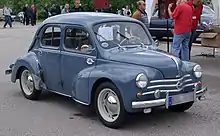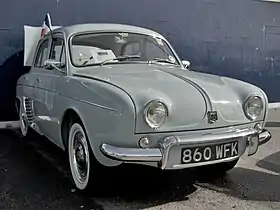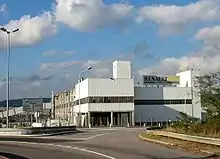Renault
Groupe Renault (UK: /ˈrɛnoʊ/ REN-oh, US: /rəˈnɔːlt, rəˈnoʊ/ rə-NAWLT, rə-NOH,[7][8] French: [ɡʁup ʁəno], also known as the Renault Group in English; legally Renault S.A.) is a French multinational automobile manufacturer established in 1899.[9] The company produces a range of cars and vans and in the past, has manufactured trucks, tractors, tanks, buses/coaches, aircraft and aircraft engines, and autorail vehicles.
 | |
 Headquarters in Boulogne-Billancourt, France | |
| Type | Public (Société Anonyme) |
|---|---|
| Euronext Paris: RNO
CAC 40 Component | |
| ISIN | FR0000131906 |
| Industry | Automotive |
| Founded | 25 February 1899 |
| Founders | |
| Headquarters | , France |
Area served | Worldwide; 128 countries[1] |
Key people | |
| Products | |
Production output | |
| Revenue | |
| Total assets | |
| Total equity | |
| Owners |
|
Number of employees | 170,158 (Q4 2020)[6] |
| Subsidiaries | List
|
| Website | renaultgroup.com |
 | |
| Owner | Renault S.A. |
|---|---|
| Country | France |
| Introduced | December 1898 |
| Website | Official website |
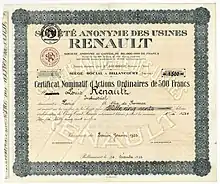
According to the Organisation Internationale des Constructeurs d'Automobiles, in 2016 Renault was the ninth biggest automaker in the world by production volume.[10] By 2017, the Renault–Nissan–Mitsubishi Alliance had become the world's biggest seller of light vehicles.[11]
Headquartered in Boulogne-Billancourt, near Paris, the Renault group is made up of the namesake Renault marque and subsidiaries, Alpine, Renault Sport (Gordini), Automobile Dacia from Romania, and Renault Korea Motors from South Korea.[12][13] Renault has a 43.4% stake with several votes in Nissan of Japan[14] and used to have a 1.55% stake in Daimler AG of Germany, which it sold off in early 2021 to help them overcome financial difficulties. (Since 2012, Renault has manufactured engines for Daimler's Mercedes A-Class and B-Class cars[15] and is also fully involved in manufacturing the Mercedes-Benz Citan van). Renault also owns subsidiaries RCI Banque (automotive financing), Renault Retail Group (automotive distribution) and Motrio (automotive parts). Renault has various joint ventures, including Oyak-Renault (Turkey) and Renault Pars (Iran). The French state owns a 15% share of Renault.[16]
Renault Trucks, previously known as Renault Véhicules Industriels, has been part of Volvo since 2001. Renault Agriculture became 100% owned by German agricultural equipment manufacturer CLAAS in 2008. Renault's shareholding in AvtoVAZ is being divested to the Government of Russia as an effect of the ongoing Russian invasion of Ukraine.
Together Renault and Nissan invested €4 billion (US$5.16 billion) in eight electric vehicles over three to four years beginning in 2011.[17] Since the launch of the Renault electric program, the group has sold more than 273,000 electric vehicles worldwide through December 2019.[18]
Renault is known for its role in motor sport, particularly rallying, Formula 1 and Formula E. Its early work on mathematical curve modeling for car bodies is important in the history of computer graphics.[19]
History
Founding and early years (1898–1918)
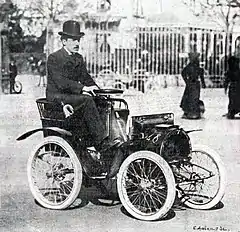
The Renault corporation was founded on 25 February 1899 as Société Renault Frères by Louis Renault and his brothers Marcel and Fernand.[9][20] Louis was a bright, aspiring young engineer who had already designed and built several prototypes before teaming up with his brothers, who had honed their business skills working for their father's textile firm. While Louis handled design and production, Marcel and Fernand managed the business.[21]
The first Renault car, the Renault Voiturette 1CV, was sold to a friend of Louis' father after giving him a test ride on 24 December 1898.[22]


In 1903, Renault began to manufacture its own engines; until then it had purchased them from De Dion-Bouton. The first major volume sale came in 1905 when Société des Automobiles de Place bought Renault AG1 cars to establish a fleet of taxis.[23] These vehicles were later used by the French military to transport troops during World War I which earned them the nickname "Taxi de la Marne."[24] By 1907, a significant percentage of London and Paris taxis had been built by Renault.[23] Renault was also the best-selling foreign brand in New York in 1907 and 1908.[25] In 1908 the company produced 3,575 units, becoming the country's largest car manufacturer.[23]
The brothers recognised the value of publicity that participation in motor racing could generate for their vehicles. Renault made itself known through succeeding in the first city-to-city races held in Switzerland, producing rapid sales growth. Both Louis and Marcel raced company vehicles, but Marcel was killed in an accident during the 1903 Paris-Madrid race.[26] Although Louis never raced again, his company remained very involved, including Ferenc Szisz winning the first Grand Prix motor racing event[27] in a Renault AK 90CV in 1906.
Louis took full control of the company as the only remaining brother in 1906 when Fernand retired for health reasons.[21] Fernand died in 1909 and Louis became the sole owner, renaming the company Société des Automobiles Renault (Renault Automobile Company).[9][23]
Renault fostered its reputation for innovation from very early on. At the time, cars were luxury items manufactured without assembly line advances. The price of the smallest Renaults at the time was 3000 francs (₣); an amount equal to ten years pay for the average worker. In 1905, the company introduced mass production techniques and Taylorism in 1913.[28] In 1911, Renault visited Henry Ford at the Highland Park factory and adopted some of the manufacturing principles from his trip.[29]
Renault manufactured buses and commercial cargo vehicles in the pre-war years. The first real commercial truck from the company was introduced in 1906.[30] During World War I, it branched out into ammunition, military aircraft engines[23] (the first Rolls-Royce aircraft engines were modeled and inspired by Renault air-cooled aircraft V8 units)[31][32] and vehicles such as the revolutionary Renault FT tank.[28] The company's military designs were so successful that Louis was awarded the Legion of Honour for his company's contributions.[33] The company exported engines to American automobile manufacturers for use in such automobiles as the GJG, which used a Renault 26 horsepower (19 kW) or 40 hp (30 kW) four-cylinder engine.[34]
Interwar years (1919–1938)
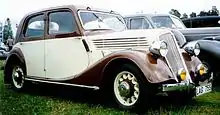
Louis Renault enlarged Renault's scope after 1918, producing agricultural and industrial machinery. The war from 1914 until 1918 led to many new products.[35] The first Renault tractor, the Type GP was produced between 1919 and 1930. It was based on the FT tank.[36] Renault struggled to compete with the increasingly popular small, affordable "people's cars," while problems with the United States stock market and the workforce slowed the company's growth. Renault also had to find a way to distribute its vehicles more efficiently. In 1920, Louis signed one of its first distribution contracts with Gustave Gueudet, an entrepreneur from Amiens, France which they still maintain a relationship.
The pre-First World War cars had a distinctive front shape caused by positioning the radiator behind the engine to give a so-called "coal scuttle" bonnet. This continued through the 1920s.[37] Only in 1930 did all models place the radiator at the front. The bonnet badge changed from circular to the familiar and continuing diamond shape in 1925. The practice of installing the radiator behind the engine against the firewall continued during the 1950s and 1960s on vehicles where the engine was installed longitudinally in the rear of the vehicle.
Renault introduced new models at the Paris Motor Show, which was held in September or October of the year. This led to confusion about model years. For example, a "1927" model was mostly produced in 1928.
Renault cars during this time period had two model lines; the economy four-cylinder engine models that in the 1930s became the suffix "Quatre" and the luxury six-cylinder models that were initially sold with the suffix "-six" that later became the suffix "Stella." For example, in 1928, when Renault produced 45,809 cars, its seven models started with a 6CV, a 10CV, the Monasix, 15CV, the Vivasix, the 18/22CV and the 40CV. Renault offered eight body styles. The longer rolling chassis were available to coachbuilders. The smaller were the most popular while the least produced was the 18/24CV. The most expensive body style in each range was the closed car. Roadsters and tourers (torpedoes) were the cheapest.

The London operation was important to Renault in 1928. The UK market was quite large and North America also received exports for the luxury car market. Lifted suspensions, enhanced cooling, and special bodies were common on vehicles sold abroad. Exports to the US by 1928 had declined to near-zero from their high point prior to WWI. A Type NM 40CV Tourer had a US list price of over US$4,600 ($78,396 in 2022 dollars[38]), about the same as a Cadillac V-12, Packard Eight, Fiat 520, or Delahaye. Closed 7-seat limousines like the Renault Suprastella started at US$6,000 ($102,256 in 2022 dollars[38]).
Cars were conservatively engineered and built. The Renault Vivasix, model PG1, was sold as the "executive sports" model beginning in 1927. Lighter weight factory steel bodies powered by a 3,180 cubic centimetre (cc) six-cylinder motor provided a formula that lasted until the Second World War.
"de Grand Luxe Renaults", those with a wheelbase over 12-foot (3.7 m), were produced in small numbers in two major types – six- and eight-cylinder. The 1927 six-cylinder Grand Renault models NM, PI and PZ introduced the new three spring rear suspension that considerably aided stability that was needed since some vehicles surpassed 90 mph (140 km/h).
The straight 8-cylinder Reinastella was introduced in 1929 and expanded to a range culminating in 1939 Suprastella. Coachbuilders included Kellner, Labourdette, J. Rothschild et Fils and Renault bodies. Closed car Renault bodies were often trimmed with interior woodwork by Rothschild.
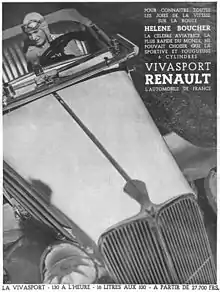
In 1928, Renault introduced an upgraded specification to its "Stella" line. The Vivastella's and Grand Renaults had upgraded interior fittings and a small star fitted above the front hood logo. This proved to be a winning differentiator and in the 1930s all cars changed to the Stella suffix from the previous two alpha character model identifiers.
The Grand Renaults were built using a considerable amount of aluminium. Engines, brakes, transmissions, floor and running boards and all external body panels were aluminium. Of the few that were built, many went to scrap to aid the war effort.
In 1931, Renault introduced diesel engines for its commercial vehicles.[30]
Renault was one of the few French vehicle manufacturers that pursued the production of aircraft engines after World War I. In the late 1920s, it attempted to produce a high-power military engine to compete with the American Pratt & Whitney units, which proved unsuccessful, although its civil engines achieved better results.[40] In the 1930s, the company took over the aircraft manufacturer Caudron, focusing its production in small airplanes,[40] acquired a stake in Air France and partnered to establish the airmail company Air Bleu.[41] Renault Caudron airplanes settled several speed world records during the 1930s. Renault continued developing tanks as part of France's rearming effort, including the D1 and the FT's replacement, the R 35.[42]
During the late 1920s and early 1930s, Renault was surpassed by Citroën as the largest car manufacturer in France. Citroën models at the time were more innovative and popular than Renault's.[43] However, by mid-1930s the French manufacturers were hit by the Great Depression. Renault could initially offset losses through its tractor, railroad and weaponry businesses, while Citroën filed for bankruptcy, and was later acquired by Michelin.[41] Renault became again the largest car manufacturer, a position it would keep until the 1980s.[41]
Renault was finally affected by the Great Depression economic crisis in 1936. The company spun off Caudron and its foundry and aircraft engine divisions into related but autonomous operations, keeping its core automotive business.[41] Between 1936 and 1938, a series of labour disputes, strikes, and worker unrest spread throughout the French automobile industry.[44] The disputes were eventually quashed by Renault in a particularly intransigent way, and over 2,000 people lost their jobs.[44][45]
World War II and aftermath (1939–1944)
After the French capitulation in 1940, Louis Renault refused to produce tanks for Nazi Germany, which took control of his factories. As Renault was manufacturing the Renault UE tank for the Allies, he produced trucks instead. On 3 March 1942, the British Royal Air Force (RAF) launched 235 low-level bombers at the Île Seguin, Billancourt, Paris plant, the largest number aimed at a single target during the war.[46] 460 metric tons (450 long tons; 510 short tons) of bombs were dropped on the plant and the surrounding area, causing extensive damage along with heavy civilian casualties.[47] Renault resolved to rebuild the factory as quickly as possible, but bombardments continued a year later, on 4 April, this time delivered by the Americans, and on 3 and 15 September 1943.[47]
A few weeks after the Liberation of Paris, at the start of September 1944, the factory gates at Renault's Billancourt plant reopened.[47] Operations restarted slowly, in an atmosphere poisoned by plotting and political conspiracy.[47] In 1936, the Billancourt factory had been the scene of violent political and industrial unrest that had surfaced under Léon Blum's Popular Front government. The political jostling and violence that followed liberation ostensibly reflected the rivalries between capitalist collaboration and communist resistance; many of the scores settled predated the invasion.[47]
Responding to the chaotic situation at Renault, a 27 September 1944 meeting of the Council of Ministers (fr) took place under de Gaulle's presidency. Postwar European politics had quickly become polarised between communists and anti-communists, and in France de Gaulle was keen to resist Communist Party attempts to monopolise the political dividends available to resistance heroes: politically Billancourt was a communist stronghold. The government decided to "requisition" the Renault factories.[47] A week later, on 4 October, Pierre Lefaucheux, a resistance leader with a background in engineering and top-level management, was appointed provisional administrator of the firm, assuming his responsibilities at once.[47]
Meanwhile, the provisional government accused Louis Renault of collaborating with the Germans. In the frenzied atmosphere of those early post-liberation days, with many wild accusations, Renault was advised by his lawyers to present himself to a judge. He appeared before Judge Marcel Martin, on 22 September 1944[47] and was arrested on 23 September 1944, as were several other French automobile-industry leaders.[47] Renault's harsh handling of the 1936–1938 strikes had left him without political allies and no one came to his aid.[45] He was incarcerated at Fresnes prison where he died on 24 October 1944 under unclear circumstances,[48] while awaiting trial.[49][50]
On 1 January 1945, by de Gaulle's decree, the company was posthumously expropriated from Louis Renault. On 16 January 1945, it was formally nationalised as Régie Nationale des Usines Renault.[47] Renault's were the only factories permanently expropriated by the French government.[51] In subsequent years, the Renault family tried to have the nationalisation rescinded by French courts and receive compensation. In 1945, and again in 1961, the Courts responded that they had no authority to review the government's actions.[45]
Postwar resurgence (1945–1971)
Under the leadership of Pierre Lefaucheux, Renault experienced both a commercial resurgence and labor unrest, that was to continue into the 1980s.
In the early 1950s, Renault assembled at least two models; "Standard Saloon" and "De Luxe Saloon" in England.[52]
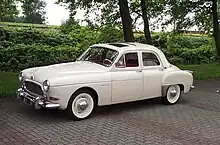
In secrecy during the war, Louis Renault had developed the rear engine 4CV[53] which was subsequently launched under Lefacheux in 1946. Renault debuted its flagship model, the largely conventional 2-litre 4-cylinder Renault Frégate (1951–1960), shortly thereafter. The 4CV proved a capable rival for cars such as the Morris Minor and Volkswagen Beetle; its sales of more than half a million ensured its production until 1961.
After the success of the 4CV, Lefacheux continued to defy the postwar French Ministry of Industrial Production, which had wanted to convert Renault solely to truck manufacture,[54] by directing the development of its successor. He oversaw the prototyping of the Dauphine (until his death), enlisting the help of artist Paule Marrot in pioneering the company's textile and color division.
The Dauphine sold well as the company expanded production and sales further abroad, including Africa and North America.[55] The Dauphine sold well initially in the US, although it subsequently became outdated against increased competition, including from the country's nascent domestic compacts such as the Chevrolet Corvair. Renault also sold the Renault Caravelle roadster, which was called the Floride outside North America.
.jpg.webp)

During the 1950s, Renault absorbed two small French heavy vehicle manufacturers (Somua and Latil) and in 1955 merged them with its own truck and bus division to form the Société Anonyme de Véhicules Industriels et d'Equipements Mécaniques (Saviem).[57]
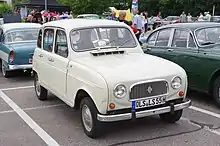
Renault then launched two successful cars – the Renault 4 (1961–1992), a practical competitor for the likes of the Citroën 2CV, and the rear-engined Renault 8.[35] The larger Renault 10 followed the success of the R8, and was the last rear-engined Renault. The company achieved success with the more modern and more upmarket Renault 16, a pioneering hatchback launched in 1966, followed by the smaller Renault 6.
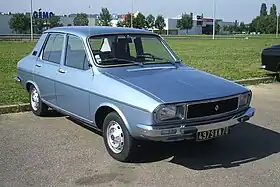
On 16 January 1970, the manufacturer celebrated the 25th anniversary of its 1945 rebirth as the nationalised Régie Nationale des Usines Renault. The 1960s had been a decade of aggressive growth: a few months earlier, in October 1969, the manufacturer had launched the Renault 12, combining the engineering philosophy of its hatchbacks with the more conservative "three-box" design. The four-door Renault 12 model fit between the Renault 6 and Renault 16. The model was a success. 1970 was also the first year during which Renault produced more than a million cars in a single year, building 1,055,803.[58]
Modern era (1972–1980)

.jpg.webp)
.jpg.webp)
The company's compact and economical Renault 5 model, launched in January 1972,[59] was another success, anticipating the 1973 energy crisis.[35] Throughout the 1970s the R4, R5, R6, R12, R15, R16, and R17 maintained Renault's production with new models including the Renault 18 and Renault 20.
During the mid-seventies, the already broad-based company diversified into more industries and continued to expand globally, including South East Asia. The energy crisis led Renault to again attempt to attack the North American market. Despite the Dauphine's success in the United States in the late 1950s and an unsuccessful assembly project in Saint-Bruno-de-Montarville, Quebec (1964–72), Renault began to disappear from North America at the end of the decade.
Renault acquired a controlling stake in Automobiles Alpine in 1973, and over the decades, Renault developed a collaborative partnership with Nash Motors Rambler and its successor American Motors Corporation (AMC). From 1962 until 1967, Renault assembled complete knock down (CKD) kits of the Rambler Classic sedans in its factory in Belgium.[60] Renault did not have large or luxury cars in its product line and the "Rambler Renault" was positioned as an alternative to the Mercedes-Benz "Fintail" cars. Later, Renault continued to make and sell a hybrid of AMC's Rambler American and Rambler Classic called the Renault Torino in Argentina (sold through IKA-Renault). Renault partnered with AMC on other projects, such as a rotary concept engine in the late 1960s.
In the late 1960s and 1970s, the company established subsidiaries in Eastern Europe, most notably Dacia in Romania, and South America (many of which remain active) and forged technological cooperation agreements with Volvo and Peugeot,[61] (for instance, for the development of the PRV V6 engine, which was used in Renault 30, Peugeot 604, and Volvo 260 in the late 1970s).

In the mid-1960s, Renault Australia was set up in Melbourne. The company produced and assembled models including the R8, R10, R12, R16, sporty R15, R17 coupes, R18, and R20. The unit closed in 1981 and the factory closed with LNC Industries taking over import and distribution of Renaults in Australia.[62]
When Peugeot acquired Citroën and formed PSA, the group's collaboration with Renault was reduced, although established joint production projects were maintained. Prior its merging with Peugeot, Citroën sold to Renault the truck and bus manufacturer Berliet[61] in December 1974,[63] merging it with its subsidiary Saviem in 1978 to create Renault Véhicules Industriels, which became the only French manufacturer of heavy commercial vehicles.[30][57] In 1976, Renault reorganised the company into four business areas: automobiles (for car and light commercial vehicles or LCVs), finance and services, commercial vehicles (coaches and trucks over 2.5 tons GVW), and minor operations under an industrial enterprises division (farm machinery, plastics, foundry, etc.). In 1980, Renault produced 2,053,677 cars and LCVs. The cars at the time were the Renault 4, 5, 6, 7, 12, 14, 16, 18, 20, and 30; the LCVs were the 4, 5, and 12 Société and the Estafette. The company added 54,086 buses/coaches and trucks.[61]
In North America, Renault partnered with American Motors Corporation (AMC), lending AMC operating capital and buying a minority 22.5% stake in the company in late 1979. The first Renault model sold through AMC's dealerships was the R5, renamed Renault Le Car. Jeep was keeping AMC afloat until new products, particularly the XJ Cherokee, could be launched. When the bottom fell out of the four-wheel drive (4×4) truck market in early 1980, AMC was in danger of bankruptcy. To protect its investment, Renault bailed AMC out with cash – at the price of a controlling 47.5% interest.[64] Renault replaced some AMC executives, and Jose J. Dedeurwaerder of Renault became President of AMC.[35]
The partnership resulted in the marketing of Jeep vehicles in Europe.[35] The Jeep XJ Cherokee may have been a joint AMC/Renault project since some early sketches of the XJ series were made in collaboration by Renault and AMC engineers (AMC insisted that the XJ Cherokee was designed by AMC personnel; even though a former Renault engineer designed the Quadra-Link front suspension for the XJ series).[65] The Jeep also used wheels and seats from Renault. Part of AMC's overall strategy was to save manufacturing costs by using Renault's parts and engineering expertise when practical. This led to the improvement of the venerable AMC inline six – a Renault/Bendix-based port electronic fuel injection system (usually called Renix) transformed it into a modern, competitive powerplant with a jump from 110 to 177 hp (82 to 132 kW) with less displacement (from 4.2 to 4.0 litres). The XJC Cherokee concept, which was conceived in 1983 as a successor to the XJ series, was also a joint collaboration with AMC and Renault engineers until the design was inherited by the Chrysler Corporation in late 1987 after Renault divested AMC – which debuted in 1989 as the Jeep Concept 1 (evolving into the Jeep Grand Cherokee in April 1992).
The Renault-AMC marketing effort in passenger cars was unsuccessful compared to the popularity of Jeep vehicles. This was because, by the time the Renault range was ready, the second energy crisis was over, taking with it much of the desire for economical, compact cars. One exception was the Renault Alliance (an Americanised version of the Renault 9), which debuted for the 1983 model year. Assembled at AMC's Kenosha, Wisconsin plant,[64] the Alliance received Motor Trend's domestic Car of The Year award in 1983.[66] The Alliance's 72% US content allowed it to qualify as a domestic vehicle, making it the first car with a foreign nameplate to win the award. (In 2000, Motor Trend did away with separate awards for domestic and imported vehicles.) A surprising side effect of the AMC linkup was that Renault felt the effects of the Arab League boycott of companies doing business with Israel, as AMC built Jeeps there under license. Plans to sell the Renault 9 in the Middle East were mothballed as a result.[67]
Introductions in the US during the 1980s included the Renault Alliance GTA and GTA convertible – an automatic-top convertible with a 2.0 L engine – big for a car of its class and the Renault Fuego coupé. The Alliance was followed by the Encore (US version of the Renault 11), an Alliance-based hatchback.[64] In 1982, Renault become the second European automaker to build cars in the US, after Volkswagen. However, bland styling and poor product quality proved insurmountable.[68]
Eventually, Renault sold AMC to Chrysler in 1987 after the assassination of Renault's chairman, Georges Besse by Action directe.[35] The Renault Medallion (Renault 21 in Europe) sedan and wagon was sold from 1987 until 1989 through Jeep-Eagle dealerships. Jeep-Eagle was the division Chrysler created out of the former AMC. Renault imports ended after 1989. A completely new full-sized 4-door sedan, the Eagle Premier, was developed during the partnership between AMC and Renault. The Premier design, as well as its state-of-the-art manufacturing facility in Bramalea, Ontario, Canada, were the starting point for the sleek LH sedans such as the Eagle Vision and Chrysler 300M.
In early 1979, as part of its attempts to expand into the US market, Renault bought a 20% stake in truck manufacturer Mack.[69][70] The aim of this operation was to make use of the company's extensive dealership network to distribute light trucks.[71] In 1983, Renault increased its stake in Mack to 44.6%.[70][71] In 1987, it transferred the ownership of a 42% stake to Renault Véhicules Industriels.[72]
In the late 1970s and early 1980s, Renault increased its involvement in motorsport, with novel inventions such as turbochargers in its Formula One cars. Renault's Head of Engines, Georges Douin, orchestrated the installation of turbocharged engines across much of the Renault range beginning in 1980. 10% of all turbocharged European cars in 1984 were Renaults.[73] The company's road car designs were revolutionary in other ways also – the Renault Espace was one of the first minivans and was to remain the most well-known minivan in Europe for the next two decades. The second-generation Renault 5, the European Car of the Year-winning Renault 9, and the most luxurious Renault yet, the aerodynamic 25, were all released in the early 1980s. At the same time, poor product quality damaged the brand. The ill-fated Renault 14 may have been the culmination of these problems in the early 1980s.
.JPG.webp)


Restructuring (1981–1995)
Renaults were somewhat successful on both road and track, including the 1984 Espace launch, which was Europe's first multi-purpose vehicle, a dozen years before any competitor. However, Renault was losing a billion francs a month totaling ₣12.5 billion in 1984. The government intervened and Georges Besse was installed as chairman; he set about cutting costs dramatically, selling many of Renault's non-core assets (Volvo stake, Gitane, Eurocar, and Renix), withdrawing almost entirely from motorsports, and laying off many employees.[74] This halved the deficit by 1986, but Besse was murdered by the communist terrorist group Action Directe in November 1986. He was replaced by Raymond Lévy, who continued Besse's initiatives, slimming the company enough that by the end of 1987, Renault was more or less financially stable. However, while Besse was convinced that Renault needed a presence in the North American market and wanted to push forward with restructuring AMC, Lévy, facing domestic losses from Renault at home, and losses from AMC in the US, along with the political climate that led to Besse's assassination, decided to sell AMC to Chrysler that same year.
The Renault 9, a small four-door family saloon, was voted European Car of the Year on its 1981 launch. It sold well in France, but was eventually eclipsed by its sister vehicle, the Renault 11 hatchback, as the hatchback body style became more popular in this size of the car. The Renault 5 entered its second generation in 1984 and continued to sell well. The long-running Renault 18 was replaced by the Renault 21 early in 1986, adding a seven-seater estate badged as the Nevada or Savanna depending on where it was sold. Renault's top-of-the-range model in the 1980s was the Renault 25, launched at the end of 1983.
In 1990, Renault strengthened its collaboration with Volvo by signing an agreement that allowed both companies to reduce vehicle conception costs and purchasing expenses. Renault had access to Volvo's expertise in upper market segments and in return, Volvo exploited Renault's designs for low and medium segments. In 1993, the two companies announced their intention to merge operations by 1 January 1994 and increased their cross-shareholding. The French accepted the merger, while Volvo shareholders rejected it.[74]
A revitalised Renault launched successful new cars in the early 1990s, accompanied by an improved marketing effort on European markets,[74] including the 5 replacement, the Clio in May 1990.[35] The Clio was the first new model of a generation that replaced numeric identifiers with traditional nameplates. The Clio was voted European Car of the Year soon after its launch, and was one of Europe's best-selling cars in the 1990s, proving even more popular than its predecessor. Other important launches included the third-generation Espace in 1996 and the innovative Twingo in 1992, the first car to be marketed as a city car MPV (multi-purpose vehicle). The Twingo was roomier than any prior cars of its size range. Twingo sales reached 2.4 million in Europe, even though the original was only built for (Continental) left-hand drive markets.[75]
_%E2%80%93_Frontansicht%252C_5._Oktober_2013%252C_M%C3%BCnster.jpg.webp)
_TCe_90_hatchback_(2013-06-17)_01.jpg.webp)
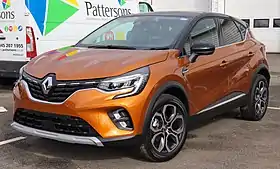

.jpg.webp)
Privatisation and the alliance era (1996–2019)
It was eventually decided that the company's state-owned status was a detriment. By 1994, plans to sell shares to public investors were officially announced.[74] The company was privatised in 1996.[35] This new freedom allowed the company to venture once again into markets in Eastern Europe and South America, including a new factory in Brazil and upgrades for its infrastructure in Argentina and Turkey. In December 1996, General Motors Europe and Renault begun to collaborate in the development of LCVs, starting with the second generation Trafic (codenamed X83).[79]
Renault's financial problems were not all fixed by the privatisation, and Renault's president, Louis Schweitzer gave to his then deputy, Carlos Ghosn, the task of confronting them. Ghosn elaborated a plan to cut costs for the period 1998–2000, reducing the workforce, revising production processes, standardising vehicle parts and pushing the launch of new models. The company also undertook organisational changes, introducing a lean production system with delegate responsibilities inspired by Japanese systems (the "Renault Production Way"), reforming work methods, and centralising research and development at its Technocentre to reduce vehicle conception costs while accelerating such conception.[74]
After Volvo's exit, Renault searched for a new partner to cope with an industry that was consolidating. Talks with BMW, Mitsubishi, Nissan, PSA and others were held and yielded a relationship with Nissan, whose negotiations with Daimler had stalled.[80] Starting on 27 March 1999, the Renault–Nissan Alliance is the first of its kind involving a Japanese and a French company, including cross-ownership. Renault initially acquired a 36.8% stake at a cost of £2.7 billion in Nissan, while Nissan, in turn, took a 15% non-voting stake in Renault.[81] Renault continued to operate as a stand-alone company, but with the intent to collaborate with its alliance partner to reduce costs. The same year, Renault bought a 51% majority stake of the Romanian company Dacia for £408.5 million,[82] thus returning after 30 years, in which time the Romanians had built over 2 million cars that primarily consisted of local versions of the Renault 8, 12 and 20. In 2000, Renault acquired a controlling stake of the newly formed South Korean Samsung Group's automotive division for £59.5 million.[83]
In Japan, Renault was formerly licensed by Yanase Co, Japan's premier seller of imported cars. However, as a result of Renault's purchase of an interest in Nissan in 1999, Yanase cancelled its licensing contract with Renault in the spring of 2000, and Nissan took over as the sole licensee, hence sales of Renault vehicles in Japan were transferred from Yanase Store locations to Nissan Red Stage Store locations.
In the late 1990s and early 2000s, Renault sold various assets to finance its inversions and acquisitions,[84] refocusing itself as a car and van manufacturer. In 1999, the company sold its industrial automation subsidiary, Renault Automation, to Comau and its engine parts division to TWR Engine Components.[84] In 2001, Renault sold its 50% stake in bus/coach manufacturer Irisbus to co-owner Iveco and its logistics subsidiary, CAT France, to Global Automotive Logistics.[84] Following the sale of Renault Véhicules Industriels to Volvo in 2001, the company retained a minority (but controlling) stake (20%) in the Volvo Group. In 2010 Renault reduced its shareholding to 6.5% and in December 2012 sold its remaining shares.[85] In 2004, Renault sold a 51% majority stake in its agricultural machinery division, Renault Agriculture, to CLAAS. In 2006, CLAAS increased its ownership to 80% and in 2008 took full control.[86]
In the twenty-first century, Renault developed a reputation for distinctive, outlandish design. The second generation of the Laguna and Mégane featured ambitious, angular designs that turned out to be successful, The 2000 Laguna was the second European car to feature "keyless" entry and ignition.[87] Less successful were the company's more upmarket models. The Avantime, a unique coupé multi-purpose vehicle, sold poorly and was quickly discontinued while the luxury Vel Satis model also disappointed. However, the design inspired the lines of the second-generation Mégane, the maker's most successful car. As well as its distinctive styling, Renault was to become known for its car safety by the independent company Euro NCAP[88] Thus, in 2001, the Laguna achieved a five-star rating,[88] followed in 2004 by the Modus,[89] and acquired control of AvtoVAZ in 2008.[90]
In April 2010, Renault–Nissan announced an alliance with Daimler. Renault supplied Mercedes-Benz with its brand new 1.6-litre turbo-diesel engine and Mercedes-Benz provided a 2.0 litre four-cylinder petrol engine to Renault–Nissan.[91] The resulting new alliance was to develop a replacement for the Smart based on the Twingo.[92]
In February 2010, Renault opened a new production factory near Tangier, Morocco, with an annual output capacity of 170,000 vehicles.[93] Initially, it manufactured the Dacia Lodgy and Dacia Dokker models followed in October 2013[94] by the second generation Dacia Sandero. The output capacity increased to 340,000 vehicles per year with the inauguration of a second production line.[95] The site is located in a dedicated free trade area, neighboring Tanger Automotive City.[96] According to Renault, the new factory emits zero carbon and industrial liquid discharges.[97] Over 100,000 vehicles were produced there in 2013. Renault expects to eventually increase production at the Tangier plant to 400,000 vehicles per year.[98]
In the 2010s, Renault increased its efforts to gain market share in the Chinese market. In 2013, it formed a joint venture with Dongfeng Motor Group named as Dongfeng Renault, based on a failed previous venture with the Chinese company Sanjiang.[99] In December 2017, it signed an agreement with Brilliance Auto to create a new joint venture (Renault Brilliance Jinbei) aimed at producing light commercial vehicles and minivans under the Renault, Jinbei and Huasong marques.[100] In December 2018, Renault announced it would acquire a "significant" stake in JMCG's electric vehicle subsidiary JMEV.[101] In July 2019, Renault took a 50% majority stake from JMEV through capital increase.[102] In April 2020, Renault announced it planned to withdraw from the Dongfeng Renault venture, transferring its stake to Dongfeng.[103]
In December 2012, the Algeria's National Investment Fund (FNI), the Société Nationale de Véhicules Industriels (SNVI), and Renault signed an agreement to establish a factory near the city of Oran, Algeria, with the aim of manufacturing Symbol units from 2014 onwards. The production output was estimated at 25,000 vehicles. The Algerian State has a 51% stake in the facility.[104][105]
In September 2013, Renault launched its brand in Indonesia, the world's fourth most populous country, with the aim of becoming one of the top European brands there until 2016. The model range at the time of the launch consisted of the Duster (locally assembled), the Koleos and the Mégane RS.[106] Later, the Clio and the Captur were also added.[107]
In April 2015, the French government upped their stake in Renault from 15% to 19.73% with the aim of blocking a resolution at the next annual general meeting that could reduce its control over the company.[108] In 2017, the government sold back shares and returned to a 15% stake as agreed with Renault.[109]
During 2016, Renault changed position on the viability of small (B-segment) diesel cars in Europe, as they become significantly more expensive when re-engineered to comply with new emissions regulations as a result of the Volkswagen emissions scandal. Renault believes that all small and some mid-size (C-segment) will no longer be diesels by 2020.[110] However, on Friday, 13 January 2017, Renault shares fell as the Paris prosecutor started an investigation into possible exhaust emissions cheating.[111][112] The company later recalled 15,000 cars for emission testing and fixing.[113][114][115] Renault, along with several other automobile companies, has been accused of manipulating the measurement equipment for NOx pollution from diesel cars. Independent tests carried out by the German car club ADAC proved that, under normal driving conditions, diesel vehicles, including the Renault Espace, exceeded legal European emission limits for nitrogen oxide (NOx) by more than 10 times.[116][117][118] Renault denied any foul play, stating compliance with French and European standards.[119]
In November 2018, Renault's CEO Ghosn was arrested by Japanese officials for allegedly underreporting his Nissan's salary, following an internal review conducted by the Japanese company. Renault traded shares fell more than 15% after the arrest was known.[120] After Ghosn's arrest, the chief operating officer and company deputy chief Thierry Bolloré became the acting CEO and the board director Philippe Lagayette the acting chairman.[121] In January 2019, following Ghosn's resignation, Renault announced it had appointed Jean-Dominique Senard as chairman and the acting CEO Bolloré as CEO.[122] In October 2019, Bolloré was fired and replaced by Renault's CFO Clotilde Delbos as acting CEO. Bolloré said his dismissal was a "coup" by Senard.[123] In January 2020, Renault announced it had named Italian Luca de Meo as its new CEO, with him taking his post on 1 July. Delbos was named as his deputy.[124]
COVID effects, company and Alliance reforms (2019–present)
In May 2020, Renault announced a cost-cutting plan aimed at eliminating 15,000 jobs worldwide, about 10% of the company's workforce, due to falling sales and the COVID-19 pandemic.[125]
In January 2021, as part of a company revamp, Renault said it would divide its automotive division into four business units: Renault, Dacia and Lada, Alpine, and Mobilize (the latter for new "new mobility services").[126][127]
On 15 February 2021, Renault launched SUV Kiger in India.[128]
In April 2021, Renault said that its revenue fell by 1.1% from the beginning of 2021 until March and it will reduce car production and focus on models with higher margins.[129]
In November 2022, Renault said it plans to spin off the electric car development into a subsidiary company tentatively called Ampere.[130] It also plans to spin off its powertrain production and development operations (including internal combustion engines and hybrid systems) into a joint venture company with Geely as co-owner.[130][131]
In January 2023, Renault said it intends to transfer almost 30% of its controlling stake in Nissan to a French trust (pending approval by both companies), reducing its shares with voting rights to a minority 15% and, in doing so, making Nissan shares in Renault to gain voting rights. The shareholding and voting ratio of both companies is set to be fixed in the future. The agreement also includes Nissan investing in Ampere and projects in various markets.[132][133] In February 2023, both companies approved the going-ahead for the shareholding changes. Final details and regulatory clearances for the transaction are set to be completed by the first quarter of 2023 and it would be done by the fourth quarter. The companies also approved joint projects and Nissan's Ampere investment.[134]
Innovations
- 1899 Louis Renault "Driving, speed-changing mechanism and reversing gear"[135] Louis Renault invented a revolutionary direct drive gear[136] with no drive belt, with much better uphill performances.
- 1963 – Renault 8 was the first serial car with four-wheel disc brake system
- 1980 – First patents for "Braking distribution device for total adherence"[137][138]
- 1988 CARMINAT, a real-time system for location and weather information. This program received European support from 1988, under the code Eureka EU-55 CARMINAT.[139] These innovations for the real-time location and human-machine interfaces are included in the Renault R-link system and Carminat TomTom devices.
Controversies
Following the 2022 Russian invasion of Ukraine which began on 24 February, many international, particularly Western companies pulled out of Russia. Unlike most of its Western competitors, Renault has been slow to announce any divestments or scaling back of its operations in Russia, drawing criticism.[140][141] On 21 March, after a brief halt, Renault resumed production at the Renault Russia car plant near Moscow.[142][143] On 23 March, while addressing the French National Assembly, Ukrainian president Volodymyr Zelenskyy called for French companies, including Renault, to leave Russia.[144] Later that day, Renault said it had "suspended" Renault Russia operations and was "assessing the available options" regarding its AvtoVAZ ownership.[145] In May 2022, Renault signed agreements to sell 100% of its shares in Renault Russia to Moscow City entity and its 67.69% interest in AvtoVAZ to NAMI (the Central Research and Development Automobile and Engine Institute). The agreement provides an option for Renault to buy back its interest in AvtoVAZ, exercisable at certain times during the next 6 years.[146]
Motorsport

Renault took part in motorsport at the beginning of the 20th century, promoted by Marcel Renault's racing interests and over the years acquired companies with a sporting connection such as Gordini and Alpine.
In the seventies, Renault set up a dedicated motorsport division called Renault Sport, and, in 1978, won the 24 Hours of Le Mans with the Renault Alpine A442. Renault has also achieved success in both rallying and in Formula One over the past few decades.
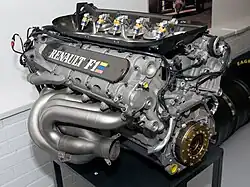
The company has also backed various one-make single-seater series such as Formula Renault and the Formula Renault 3.5. These two racing series were a step in the career of thousands of drivers, including Formula One champions Fernando Alonso, Sebastian Vettel, Kimi Räikkönen[148] and Lewis Hamilton,[149] as well as IndyCar champion Will Power.[150]
Renault Sport develops and manufactures the Renault Sport-badged cars,[151] as the Renault Clio RS (for Renault Sport) and the Renault Mégane RS, which own the world records in their categories, such as the Nürburgring,[152] and the Suzuka circuit and awards from What Car?,[153] Evo, and other magazines.
_qualifying_at_USGP_2005.jpg.webp)

.jpg.webp)

Formula One
Renault introduced the turbo engine to Formula One when they debuted their first car, the Renault RS01 at Silverstone in 1977. The Renault team continued until 1986. From 1989 Renault supplied engines for the successful Williams-Renault car.
Renault took over the Benetton Formula team in 2000[154] for the 2001 season and renamed it Renault F1 in 2002. In 2005 and 2006 the team won the Constructors' and Drivers' titles (with Fernando Alonso).[155] At the 2005 French Grand Prix Carlos Ghosn set out his policy regarding the company's involvement in motorsport:
- "We are not in Formula One out of habit or tradition. We're here to show our talent and that we can do it properly ... Formula One is a cost if you don't get the results. Formula One is an investment if you do have them and know how to exploit them."
Renault powered the winning 2010 Red Bull Racing team, and took a similar role with its old team in December 2010, when it sold its final stake to the investment group Genii Capital, the main stakeholder[156] since December 2009,[157] ending Renault's direct role in running a F1 team for the second time.[158]
Renault bought the Enstone-based team for the 2016 season, rebranding it Renault.[159][160] In 2021, the team was renamed Alpine F1 Team and became part of the new Alpine business unit, with Renault retained as the engine nameplate.
Rallying
Renault has been involved in rallying from an early era. Marcel Renault won the 1902 Rallye Paris-Vienna, but lost his life while competing in the 1903 Paris-Madrid rally.[161]
During the 1950s and 1960s, Renault manufactured several small cars with rear wheel drive in some cases, as the 4CV, the R8 or the Dauphine. These cars were well-adapted to the rally of the time, and the tuner Amedee Gordini collaborated with its performance.[161] In the 1950s the Renault Dauphine won several international rallies, including the 1956 Mille Miglia and the 1958 Monte Carlo Rally.[162]
In 1973, Renault took control of Automobiles Alpine, a related company for several years, which was responsible for building successful rally cars such as the A110.[163] A highly evolved A110 won the first World Rally Championship, representing Alpine-Renault.[161]
In 1976, the Alpine's competition department and the Gordini factory at Viry-Chatillon were merged into Renault Sport.[163] The focus shifted to Formula One, although Renault achieved several victories including the 1981 Monte Carlo Rally with the Renault 5 Turbo[162] before retirement from the world rally in late 1994.[161]
Renault cars also participate of cross-country races, most prominently the Dakar Rally. The Marreau brothers won the 1982 edition driving a Renault 20 Turbo 4x4 prototype.[164]
Later, Renault provided a Renault Megane platform and sponsored the Schlesser-Renault Elf buggies that won the 1999[165] and 2000 editions.[166] The 1999 car was the first two-wheel drive Dakar's winner.[167]
Renaults won the European Rally Championship four times, in 1970, 1999, 2004 and 2005.[168]
Financial data
| Year | 2013 | 2014 | 2015 | 2016 | 2017 | 2018 | 2019 |
|---|---|---|---|---|---|---|---|
| Revenue | 40.932 | 41.055 | 45.327 | 51.243 | 58.770 | 57.419 | 55.537 |
| Net income | 0.695 | 1.998 | 2.960 | 3.543 | 5.210 | 3.302 | -141 |
| Assets | 74.992 | 81.551 | 90.605 | 102.103 | 109.943 | 114.996 | 122.171 |
| Employees | 121,807 | 117,395 | 120,136 | 124,849 | 181,344 | 183,002 | 179,565 |
Corporate governance
Renault's head office is in Boulogne-Billancourt.[170] The head office is located near the old Renault factories; Renault has maintained a historical presence in Boulogne-Billancourt[171] since the company's opening in 1898.[170]
Renault is administered through a board of directors, an executive committee and a management committee.[172] As of January 2019, members of the 19-seat board include Jean-Dominique Senard (as chairman), Cherie Blair, Catherine Barba and Pascale Sourisse.[173] Clotilde Delbos is the acting CEO.
Products and technologies
| Best-selling Groupe Renault models in 2019[174] including Dacia and Renault Samsung marque | ||
|---|---|---|
| Rank | Model | Sales |
| 1 | Clio | 433,201 |
| 2 | Sandero | 409,731 |
| 3 | Duster | 296,848 |
| 4 | Captur/Kaptur | 263,476 |
| 5 | Mégane + Scénic | 253,830 |
| 6 | Logan/Symbol | 207,912 |
| 7 | Kwid | 186,647 |
| 8 | Kangoo | 125,911 |
| 9 | Kadjar | 125,300 |
| 10 | Master | 108,760 |
Current models
Current model line up, with calendar year of introduction:[175]
- Clio (1990–present; hatchback)
- Twingo (1992–present; hatchback)
- Mégane (1995–present; hatchback, estate)
- Mégane E-Tech Electric (2021–present; crossover SUV)
- Kangoo (1997–present; developed by Renault and sold in some markets as the Mercedes-Benz Citan and the Nissan Townstar)
- Twizy (2012–present)
- Zoe (2012–present; hatchback)
- Captur (2013–present)
- Duster Oroch (Latin America only) (2015–present; pick-up)
- Kwid (China, India, and Latin America only) (2015–present; hatchback)
- Alaskan (Latin America only) (2016–present; pick-up)
- Triber (India only) (2019–present; mini MPV)
- Kiger (India only) (2021–present)
- Taliant (Africa, Central Europe, Eastern Europe, Latin America, and Middle East only) (2021–present; restyled Dacia Logan)
- Austral (2022–present)
Dacia vehicles, sold in some markets under the Renault marque:
Renault Samsung vehicles, sold in some markets under the Renault marque:
- Koleos (2008–present; Renault Samsung QM5/Renault Samsung QM6)
- Arkana (2020–present; Renault Samsung XM3)
Renault light commercial vehicles:
- Master (1980–present; developed by Renault and sold in some markets as the Nissan Interstar)
- Trafic (1980–present; developed by Renault and sold in some markets as the Mitsubishi Express and the Nissan Primastar)
- Kangoo (1997–present; developed by Renault and sold in some markets as the Mercedes-Benz Citan and the Nissan Townstar)
- Express (2021–present; developed by Renault and sold in some markets as the Mercedes-Benz Citan and the Nissan Townstar)
Dacia light commercial vehicles, sold in some markets under the Renault marque:
- Dokker (2012–present)
- Duster Commercial (2017–present)[176][177]
Concept cars

Renault concept cars show future design and technology directions. Since 2008, Renault has displayed various all-electric car concepts under the name "Z.E.", for zero emission, starting with a concept based on the Renault Kangoo Be Bop. Further concepts and announcements followed, with the production of the Fluence Z.E. saloon beginning in 2011 and the Renault Zoe in 2012.
Renault revealed the Ondelios hybrid concept in 2008.[178][179] but this was overtaken by the Z.E. programme. However, Renault presented a new hybrid car in September 2014, the Eolab, which incorporates various innovations that the company said will be added to production models by 2020.[180]
In 2014 at the New Delhi Auto Show, Renault announced a new model, the Kwid Concept, which comes with helicopter drone.[181]
Electric vehicles
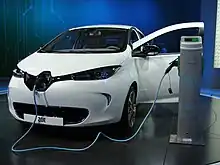
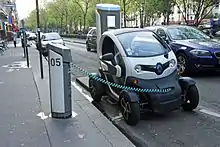
In 2013, Renault became the leader of electric vehicles sales in Europe, thanks to its large range of vehicles (Twizy, Zoe, Fluence, Kangoo).[182] The Renault Zoe was Europe's best selling all-electric car in 2015 and 2016.[183][184] Global Zoe sales reached the 50,000 unit mark in June 2016,[185] and achieved the 150,000 unit milestone in June 2019.[186] Groupe Renault global electric vehicle sales passed the 100,000 unit milestone in September 2016.[187][188] Since the launch of the Renault electric program, the Group has sold more than 273,550 electric vehicles worldwide through December 2019. Since inception, a total of 181,893 Zoe city cars, 48,821 Kangoo Z.E. electric vans, 29,118 Twitzy heavy quadricycles, and 10,600 Fluence Z.E. cars have been sold globally through December 2019.[18]
Beginning in 2008, Renault made agreements for its planned zero-emissions products, including with Israel, Portugal, Denmark and the US states of Tennessee and Oregon,[189] Yokohama in Japan and the Principality of Monaco.[190] Serge Yoccoz is the electric vehicle project director.[191]
In 2008, Renault–Nissan signed a deal to produce electric cars for an initiative in Israel with Better Place, a US company developing new non-petroleum–based transport infrastructure. Renault aimed to sell 10–20,000 cars a year in Israel.[192] Renault also agreed to develop exchangeable batteries for the project.[193] Renault collaborated with Better Place to produce a network of all-electric vehicles and thousands of charging stations in Denmark, planned to be operational by 2011.[194] The Renault Fluence Z.E.,[195] was selected for the Israel project. It became the first zero-emission vehicle with a switchable battery,[196] with trials in 2010 undertaken with the Renault Laguna. Renault ended the partnership in 2013, following Better Place's bankruptcy, with only 1,000 vehicle sales in Israel and 240 in Denmark.[197]
Renault–Nissan and the largest French electric utility, Électricité de France (EDF), signed an agreement to promote electric vehicles in France. The partnership planned to pilot projects on battery management and charging infrastructure.[198] Renault–Nissan also signed deals with Ireland's Electricity Supply Board (ESB),[199] and in Milton Keynes as part of the UK's Plugged in Places national project.[200]
We have decided to introduce zero-emission vehicles as quickly as possible in order to ensure individual mobility against the background of high oil prices and better environmental protection
— Carlos Ghosn, CEO of Renault and Nissan[189]
According to Ghosn, the Renault–Nissan alliance was a fundamental step in electric car development, and that they needed each other for other issues such as battery manufacturing, charging infrastructure and business strategy.[201]
I don't think either Renault or Nissan would have been able to launch an EV alone successfully. You can have an electric car alone. But what you cannot have is an EV business system, from batteries to recycling to cars to infrastructure to negotiation, by being alone.
— Carlos Ghosn, CEO of Renault and Nissan[201]
The Renault–Nissan group is a member of the PHEV Research Center. In September 2013, Renault and Bolloré announced an agreement to collaborate on a new electric vehicle and in car-sharing project.[202]
In 2021, Renault launched a new EV and mobility brand called Mobilize[203] and showed a prototype for a small Twizy-style[204] EV called the EZ-1.[205][206][207] Renault Group also invested into a start-up company Verkor, that should develop EV batteries and about in 2026 build a gigafactory in France.[208]
By 2025 the yearly output of 400,000 electric vehicles is planned.
Eco²
In 2007 Renault introduced a new line of eco-friendly derivatives marked eco² that were based on production platforms. A minimum of 5% recycled plastic was used and the vehicle's materials were 95% reusable. Eco²'s CO2 emissions were not to exceed 140g/km, or would be biofuel compatible.[209] At the 2008 Fleet World Honours, Renault received the Environment Award. The chairman of Judges, George Emmerson, commented, "This was the most hotly contested category in the history of the Fleet World Honours, such is the clamour for organizations' green credentials to be recognised. There were some very impressive entries, but the panel felt that Renault's impressive range of low-emission vehicles was the most tangible, and the most quantifiable.[210]
R-Link
The R-Link infotainment system, developed by Renault and the CCETT labs during the 1980s,[139] produced with TomTom and fitted in Renault's vehicles, was ranked first in a user accessibility study performed by an independent consulting British company SBD. R-Link received 85% of the users' satisfaction, whereas the second "big five" automotive maker got a 10% lower satisfaction from the users.[211][212]
Autonomous vehicles
Renault plans to introduce autonomous vehicle technology by 2020. The company unveiled a prototype, the Next Two (based on the Zoe), in February 2014.[213]
Vehicle design
"Pre-design" era
During its early years, Renault only manufactured the cars' chassis, while the bodywork was completed by coachbuilders. The first car with Renault's bodywork was the "Taxi de la Marne" introduced in 1905.[214] Most Renault-made bodyworks were simple and utilitarian until the Reinastella unveiling in 1928. In the 1930s, Renault developed streamlined cars such as the Viva Grand Sport. In the 1950s, the company worked with Ghia designers.[215]
Renault Styling
In 1961, with the assistance of the independent designer Philippe Charbonneaux (responsible for the R8), the company created Renault Styling as a design department, led by Gaston Juchet since 1963.[215][216] In 1975, Robert Opron was named chief designer[216] and Renault Styling was divided into Interior, Exterior and Advanced Design groups.[214]
In the 1960s, an in-house computer-aided design (CAD) computer-aided manufacturing (CAM) system called UNISURF was introduced, led by Pierre Bézier (who popularised Bézier curves and worked at Renault from 1933 until 1975).
Industrial Design Department
In 1987, Renault named Patrick le Quément as chief designer[217] and created the Industrial Design Department to replace Renault Styling. The new division incorporated a new management system, with more technology and personnel. Renault gave it the same importance as Engineering and Product Planning, participating in product development.[214][216]
Le Quément was responsible for bold designs such as the Mégane II and the Vel Satis,[218] giving Renault a more coherent and stylish image.[219] In 1995, Design and Quality were merged under le Quément's direction.[214][217] Later, the new department moved to Guyancourt's Technocentre, which also became the base for Engineering and Product Planning. The group was organised in three sections: Automobile Design; Truck, LCV and Bus Design; and Concept Cars and Advanced Design. During the next years, satellite centres opened in Spain (1999), Paris (2000), South Korea (2003), Romania (2007), India (2007),[214][216] Brazil (2008)[220] and China (2019).[221]
At the end of 2009, le Quément was replaced by Laurens van den Acker,[217] who introduced the "cycle of life" concept to Renault's design.[222]
Engineering and Product Planning

Most of Renault engineering was decentralised until 1998, when the Technocentre became the main Renault's engineering facility.[74][223] Satellite centres exist, including Renault Technologies Americas (with branches in Argentina, Brazil, Chile, Colombia and Mexico), Renault Technologies Romania (branches in Morocco, Russia, Slovenia and Turkey) and Renault Technologies Spain (branch in Portugal).[224] As of 2013, Renault's engineering section had over 6,500 employees worldwide, of which 34% were engineers and 63% technicians.[225] Engine development is in charge of a specific division, Renault Powertrains, with nearly 65 engineers.[226] Overseas engineering is increasing and research and design teams are in charge of adjusting existing vehicles to local needs and budgets.[227]
As of 2014, Engineering, and Product Planning, are directed by Gaspar Gascon Abellan[228] and Philippe Klein[229] respectively.
Technocentre

The Renault Technocentre (French pronunciation: [ʁəno tɛknɔˈsɑ̃tʁ]) is the main research and development facility. It is located in Guyancourt. It covers 150 hectares (370 acres)[230] and integrates all departments involved in developing products and industrial processes (design, engineering and product planning) as well as supplier representatives. The Technocentre gathers more than 8,000 employees[231] and comprises three main sections: The Advance Precinct, The Hive and the prototype build centre. The Advance Precinct, a stepped structure surrounded by a lake, has design studios and other departments related to early design stages. The Hive is the tallest structure and includes research and engineering facilities dedicated to the development process of new vehicles. The prototype build centre is an extension of The Hive. The three main structures are accompanied by smaller technical buildings.[223]
The Technocentre was one of the first enterprises to have real-time life-size 3D modelling systems.[232]
Renault Tech
Renault Tech is a division of Renault Sport Technologies, headquartered in Les Ulis. It was established in 2008 and is in charge of modifying cars and vans for special purposes (mobility cars, driver's school cars, and business fleets).[233][234]
Subsidiaries and alliances
| Top 10 Groupe Renault vehicle sales by country, 2019[174] | |||
|---|---|---|---|
| Rank | Location | Vehicle sales |
Market share |
| 1 | 698,723 | 25.9% | |
| 2 | 508,647 | 29.0% | |
| 3 | 247,155 | 6.3% | |
| 4 | 239,174 | 9.0% | |
| 5 | 220,403 | 10.5% | |
| 6 | 183,264 | 12.4% | |
| 7 | 179,494 | 0.7% | |
| 8 | 109,952 | 4.1% | |
| 9 | 88,869 | 2.5% | |
| 10 | 86,859 | 5.0% | |
| A Including AvtoVAZ sales |
| B Including Jinbei and Huasong sales |
_03.jpg.webp)
Dacia
In 1999, Renault acquired a 51% controlling stake from the Romanian-based manufacturer Automobile Dacia, which was later increased to 99.43%.[235] As part of the Renault group, Dacia is a regional marque of entry-levels cars focused on Europe and Northern Africa which shares various models with the Renault marque.[14]
Renault Korea Motors
Renault acquired the car division of Samsung on 1 September 2000 in a $560 million deal for 70% of the company,[236] eventually increasing its stake to 80.1%.[237] The majority of the company's production at its Busan plant is exported under the Renault badge.[238]
RCI Banque
RCI Banque is a wholly owned subsidiary that provides financial services for Renault marques worldwide and Nissan marques in Europe, Russia and South America.[239][240]
Renault Retail Group
Renault Retail Group is Renault's wholly owned automobile distributor for Europe.[241] In 1997, the French branches were merged to establish the subsidiary Renault France Automobiles (RFA). In 2001, it served as the basis for Renault Europe Automobiles (REA), which managed sales in Europe.[242] In 2008, the company adopted its current name.[243] Renault Retail Group operates in France, Austria, Belgium, the Czech Republic, Germany, Italy, Luxembourg, Poland, Portugal, Spain, Switzerland, and the United Kingdom.[241]
French factories
|
|
Manufacturing subsidiaries outside France
|
|
Renault–Nissan–Mitsubishi
Renault has a 43.4% stake in Nissan, thereby giving it effective control, and Nissan holds a 15% stake (with no voting rights) in Renault. Renault has a 50% stake in the joint venture Renault-Nissan b.v., which was established to manage the Renault-Nissan alliance. The company is responsible for the management of two joint companies, RNPO (Renault Nissan Purchasing Organization) and RNIS (Renault-Nissan Information Services).[255] Combined vehicle sales in 2008 reached 6.9 million (including AvtoVAZ), making the Renault-Nissan Alliance the world's third-largest automotive group.[256]
As well as sharing engines and joint-development of zero-emissions technology, Nissan increased its presence in Europe by badging various Renault van models such as the Renault Kangoo/Nissan Kubistar, Renault Master/Nissan Interstar and the Renault Trafic/Nissan Primastar. Some passenger cars have also been badge-engineered, such as the Renault Clio-based Nissan Platina in Brazil. The "Renault Production System" standard used by all Renault factories borrowed extensively from the "Nissan Production Way" and resulted in Renault productivity improving by 15%. The alliance led to the loss of 21,000 jobs, and the closure of three assemby and two powertrain plants.[257]
In March 2010 the Renault-Nissan alliance opened its first joint facility in Chennai, India, investing 45 billion rupees (US$991.1 million).[258] The facility builds the Nissan Micra. The Renault Fluence and Renault Koleos are intended to be assembled there from completely knocked-down units. As a result of opening its own factory, Renault ended its five-year Mahindra Renault joint venture with Mahindra & Mahindra company to make and sell the Renault Logan in India.[259]
Renault–Nissan–Mitsubishi and Daimler alliance
On 7 April 2010 Ghosn and Daimler AG CEO Dieter Zetsche announced a partnership between the three companies.[260] Daimler acquired a 3.10 per cent stake in Renault-Nissan and Renault and Nissan each took a 1.55 per cent stake in Daimler.[261]
American Motors
In 1979, Renault entered into an agreement with American Motors Corporation (AMC) to sell cars in the US.[262] A year later, Renault acquired a 22.5% interest in AMC.[263] This was not the first time the two companies had worked together. In the early 1960s, Renault assembled CKD kits and marketed Ramblers in France.[264] In 1982, Renault increased its stake in AMC to 46.4%.[265] The Renault Alliance/Encore (a modified version of the Renault 9 and 11) entered production in the US, but following AMC's continued decline, Renault withdrew from the US in 1987 and sold its share to Chrysler.[266]
Proposed alliances
On 30 June 2006, the media reported that General Motors convened an emergency board meeting to discuss a proposal by shareholder Kirk Kerkorian to form an alliance with Renault-Nissan. However, GM CEO Richard Wagoner felt that an alliance would disproportionately benefit Renault's shareholders and that GM should receive compensation accordingly. Talks between GM and Renault ended on 4 October 2006.[267]
In 2007, Renault-Nissan entered talks with Indian manufacturer Bajaj Auto to develop a new ultra-low-cost car along the lines of the Tata Nano.[268] Renault's existing partner in India, Mahindra, was not interested in the project. The proposed joint venture did not come to fruition and in late 2009 the companies announced that Bajaj would develop and manufacturer the vehicle and supply Renault-Nissan with completed cars.[269]
On 7 October 2008 a Renault executive said the company was interested in acquiring or partnering with Chrysler.[270] On 11 October 2008, the New York Times reported that General Motors, Nissan and Renault had all been in discussions over the past month with Chrysler's owner Cerberus Capital Management about acquiring Chrysler.[271]
In May 2019, Fiat Chrysler Automobiles proposed merging its business with Renault.[272] The proposal was later withdrawn.[273]
Awards
Renault models have won the European Car of the Year award six times in the last forty years:
- 1966: Renault 16[274]
- 1982: Renault 9[275]
- 1991: Renault Clio[276]
- 1997: Renault Scénic[277]
- 2003: Renault Mégane II[278]
- 2006: Renault Clio III[279]
Renault cars have won numerous national-level awards in Spain, Australia, Ireland, the United States,[66][280] Denmark, and elsewhere. Renault and its Dacia subsidiary have won three "Autobest" car of the year awards for the Duster, Logan, and Symbol models.[281]
Under the patronage of the Italian Ministry of Culture, in the 2016 edition of the Corporate Art Awards Renault received by pptArt the award for its Art Collection that inspired the creativity of its car designers.[282]
Marketing and branding
Renault markets its products under five marques: Renault, Lada, Dacia, Renault Samsung Motors, and Alpine.[283]
Renault badge
Renault's first badge was introduced in 1900 and consisted of the Renault brothers' intertwined initials. When the company started mass production in 1906, it adopted a gear-shaped logo with a car inside it. After World War I the company used a logo depicting an FT tank. In 1923 it introduced a new circle-shaped badge, which was replaced by the "diamond" or lozenge in 1925.[284] The lozenge of Renault means a diamond that expresses the brand's firm desire to project a strong and consistent corporate image.[285]
The Renault diamond logo has been through many iterations.[284] To modernise its image, Renault asked Victor Vasarely to design its new logo in 1972. The transformed logo maintained the diamond shape. The design was later revised to reflect the more rounded lines of the brand's new styling cues.[286] The current badge has been in use since 1992.
The logo for web and print use was updated three times thereafter. In 2002 a more realistic representation inside a yellow rectangle was made which is still used as the Renault Trucks logo albeit in red. In 2004 the logo received the Renault Identité typeface. In 2007, Saguez & Partners produced a version with the wordmark and logo inside a square.[284][287]
In April 2015, Renault introduced new designs to differentiate the company from the product brand, as part of the 'Passion for life' campaign. The new brand logo replaced the yellow background with a yellow stripe. A new typeface was also introduced. A corporate logo was unveiled at the 2015 Annual General Meeting, incorporating Renault, Dacia and Renault Samsung Motors.[288][289]
January 2021 saw the introduction of a new flat diamond logo alongside the Renault 5 Prototype electric concept car. The logo received so much positive feedback that Renault officially introduced the new symbol as their logo in March 2021, according to Renault's design director Gilles Vidal, who joined the group in 2020. They plan to introduce the new diamond on many online platforms in June 2021 and the first model with the new logo featured will be revealed in 2022.[290]
The yellow associated with the company appeared initially in the diamond badge of 1946, when Renault was nationalised.[284][285]
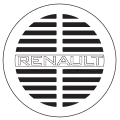 Logo of Renault from 1923 to 1925
Logo of Renault from 1923 to 1925 Logo of Renault from 1925 to 1946
Logo of Renault from 1925 to 1946 Logo of Renault from 1946 to 1959
Logo of Renault from 1946 to 1959 Logo of Renault from 1959 to 1971
Logo of Renault from 1959 to 1971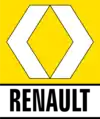
 Logo of Renault from 1972 to 1981 (Vasarely Logo)
Logo of Renault from 1972 to 1981 (Vasarely Logo) Logo of Renault from 1981 to 1992
Logo of Renault from 1981 to 1992 Logo of Renault from 1992 to 2004
Logo of Renault from 1992 to 2004 Logo of Renault from 2004 to 2007
Logo of Renault from 2004 to 2007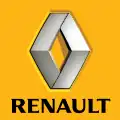 Logo of Renault from 2007 to 2015
Logo of Renault from 2007 to 2015 Logo of Renault from 2015 to 2021 (still used as a badge)
Logo of Renault from 2015 to 2021 (still used as a badge) Logo of Renault since 2021
Logo of Renault since 2021 Groupe Renault logo up to 2021 (as distinct from the Renault diamond used for the brand)
Groupe Renault logo up to 2021 (as distinct from the Renault diamond used for the brand) Renault Group logo from 2021 onwards
Renault Group logo from 2021 onwards
Renault MN
Both the Renault logo and its documentation (technical as well as commercial) historically used Renault MN, a custom typeface developed by British firm Wolff Olins. This type of family is said to have been designed mainly to save costs at a time where the use of typefaces was costly.
A retail version of the font family was sold by URW++ as Renault.[293]
Renault Identité
In 2004, French typeface designer Jean-François Porchez was commissioned to design a replacement. This was shown in October of that year and was called Renault Identité.[294] The OpenType font family was developed from the Renault logotype created by Éric de Berranger.[295][296]
Helvetica
Since 2007, as part of the Saguez & Partners revamp, all graphic advertising makes use of Helvetica Neue Condensed.[297]
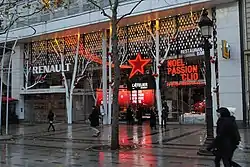
Renault Life
The Renault Life font family was built by Fontsmith Limited, based on the foundry's FS Hackney font family.[299]
The family consists of six fonts in three weights (Life, Regular, and Bold) and one width, with complimentary italic.
L'Atelier Renault Paris
Renault's flagship showroom, L'Atelier Renault (French pronunciation: [latəlje ʁəno]), is located on the Champs-Élysées in Paris, with other manufacturers such as Peugeot, Citroën and Toyota. It opened in November 2000, located on the site of Pub Renault, which operated from 1963 until 1999. The first Renault venue at the location was the Magasin Renault in 1910, a pioneering car showroom.[300][301]
L'Atelier features a Renault Boutique as well as regular exhibitions featuring Renault and Dacia cars. An upmarket restaurant is located on the second floor, looking out onto the Champs-Élysées. The ground floor can hold up to five exhibitions at any one time. As of March 2009, 20 million visitors had visited L'Atelier Renault.[302][303][304]
Renault Classic
Renault Classic is a department within Renault that seeks to collect, preserve and exhibit notable vehicles from the company's history. Originally named Histoire & Collection, the collection was assembled in 2002 and its workshops formally opened on 24 April 2003.[305]
Music
Throughout the 1980s and 1990s, Renault's European advertising made extensive use of Robert Palmer's song "Johnny and Mary".[306] Television advertisements initially used Palmer's original version, while a range of special recordings in different styles were produced during the 1990s, most famously the acoustic interpretation by Martin Taylor that he released on his album Spirit of Django.
Sponsorship
Renault has sponsored films as an advertising technique since 1899. A Renault Voiturette Type A, driven by Louis Renault, appeared in one of the Lumières' early films.[307][308] Between 1914 and 1940, the company commissioned a series of documentary films to promote its industrial activities.[309] Renault also backed some films set in Africa during the 1920s to promote the reliability of its products on tough conditions.[308] Since 1983, the company sponsors the Cannes Film Festival[310] and it has also sponsored other festivals as the Venice Film Festival, the Marrakech Film Festival[311] and the BFI London Film Festival.[312]
Through its foundations and institutes, Renault funds projects around the world that focus on: education through scholarships,[313] road safety[314] and diversity.
See also
References
- "Our plants, labs, design and engineering center - Renault Group". renaultgroup.com.
- "Renault chairman: Could seek 4-5 billion euros worth of bank loans". Reuters. 10 April 2020.
- "French carmaker Renault names Luca de Meo as new CEO". Reuters. 28 January 2020.
- "Earnings report 2021" (PDF). Renault Group. Retrieved 17 March 2022.
- "Key figures". Groupe Renault. Retrieved 29 September 2023.
- "Facts and figures 2020" (PDF). Renault. pp. 6, 7. Retrieved 15 May 2021.
- Wells, John C. (2008). Longman Pronunciation Dictionary (3rd ed.). Longman. ISBN 978-1-4058-8118-0.
- Jones, Daniel (2011). Roach, Peter; Setter, Jane; Esling, John (eds.). Cambridge English Pronouncing Dictionary (18th ed.). Cambridge University Press. ISBN 978-0-521-15255-6.
- Boutillier, Sophie; Uzunidis, Dimitri (2006). L'aventure des entrepreneurs [The entrepreneurs' adventure]. Studyrama perspectives (in French). Vol. 625. Studyrama. pp. 28–29. ISBN 2-84472-790-5.
- "World motor vehicle production. OICA correspondents survey. World ranking of manufacturers year 2016" (PDF). OICA. Retrieved 14 October 2017.
- "Renault-Nissan beats Volkswagen AG to become the world's top-selling automaker for 2017". Business Insider France. Retrieved 7 September 2018.
- Pearson, David (8 July 2010). "Renault's First-Half Global Sales Rise 22%". The Wall Street Journal. Retrieved 24 February 2014.
- "2016/2017 Annual Report" (PDF). Renault. p. 19. Retrieved 15 June 2017.
- Ciferri, Luca (10 January 2014). "Why Ghosn favors separate CEOs for Renault and Nissan". europe.autonews.com. Automotive News Europe. Archived from the original on 24 February 2014. Retrieved 24 February 2014.
- "Our strategic partnerships". Renault. Archived from the original on 12 February 2015. Retrieved 22 February 2015.
- "Key figures - Renault Group".
- "Renault presents stunning electric range at Frankfurt 2009". Gizmodo. 15 September 2009. Retrieved 15 April 2015.
These four vehicles will cover a range of uses and customers who will nonetheless all have one thing in common: they will be entering a new era of zero-emission mobility. The first will be the electric version of Fluence which will initially be available in Israel and Europe. The second will be an electric version of Renault Kangoo Express, intended primarily for fleet and business use. The range of electric vehicles will then expand to cover other segments, with two vehicles that will be designed from scratch as electric vehicles. Derived from the Twizy Z.E. Concept, the third vehicle will target urban mobility. The fourth vehicle, which takes it inspiration from Zoe Z.E. Concept, will go on sale at the beginning of 2012 and will be a multi-purpose daily driver for built-up areas.
- Groupe Renault (19 March 2020). "2019 Universal Registration Document" (PDF). Renault. Retrieved 22 May 2020.
Since the launch of the Renault electric program, the Group has sold more than 252,000 electric vehicles in Europe and more than 273,550 electric vehicles worldwide.
See pp. 24 and 39. Since inception, a total of 181,893 Zoe cars, 48,821 Kangoo Z.E. electric vans, 29,118 Twitzy heavy quadricycles, and 10,600 Fluence Z.E. cars have been sold globally through December 2019. - "Renault SA SWOT Analysis". Renault SA SWOT Analysis (SWOT Analysis). Boulogne-sur-Mer (France): MarketLine: 1–8. 6 July 2018. EBSCOhost AN 131413771. Retrieved 24 October 2018 – via EBSCO Information Services.
- Porázik, Juraj; Oravec, Ján (1985). Old time classic cars, 1885–1940. Arco Pub. p. 58. ISBN 0-668-06307-6.
- "A brief history of the House of Renault". Automotive Industries. New York: Automotive Industries. 20 (14): 569–570. 8 April 1909. ISSN 1099-4130.
- Heidi Klum & Seal The truth about the divorce. epubli.
- Smith, Michael Stephen (2006). "The Automobile and its Allies". The Emergence of Modern Business Enterprise in France, 1800–1930. Harvard Studies in Business. Vol. 49. Harvard University Press. pp. 402–405. ISBN 0-674-01939-3.
- "Une page d'histoire - le taxi de la Marne" [A page of the history - The Taxi de la Marne]. francebleu.fr. France Bleu. 11 March 2013. Retrieved 15 April 2013.
- "Renault leads the foreigners". Automotive Industries. New York: Automotive Industries. 20 (4): 212. 28 January 1909. ISSN 1099-4130.
- Weeks, Lyman Horace (2010). The History of the Automobile And Its Inventors. Books on Demand. pp. 101–102. ISBN 978-3-86195-242-8.
- "100 years in the driving seat: Renault celebrates a century of Grand Prix Victories". Renault UK. Retrieved 1 March 2008.
- "Renault official history". Renault.co.uk. Retrieved 7 September 2011.
- "The Île Seguin Renault Factory". Architectuul. Retrieved 15 January 2021.
- Bradley, Elliot (1979). Trucks and trucking. Crescent Books. p. 94. ISBN 0-517-27343-8.
- "The Rolls-Royce board was determined to resist Government requests to start making aero engines in Derby – it soon changed its mind". Derby Telegraph. Local World. 13 August 2014. Archived from the original on 10 January 2015. Retrieved 24 February 2014.
- "The 10 Best Brand Extensions Ever (According To Me). 7)Rolls-Royce Aircraft Engines". Time. 13 March 2012. Archived from the original on 24 December 2013. Retrieved 24 February 2014.
- "Science Photo Library". Sciencephoto.com. Retrieved 7 September 2011.
- De Angelis, Marianne. "The GJG and the New York Guard" (PDF). New York State Military Museum. Retrieved 21 June 2014.
- Pederson, Jay P.; Derdak, Thomas (1999). International Directory of Company Histories. Vol. 26. St. James Press. pp. 401–403. ISBN 1-55862-385-X.
- Williams, Michael (1974). Farm tractors in color. New York: Macmillan Publishers. p. 31. ISBN 0-02-629300-5.
- "Lot 128 / Sale 5545: 1909 Renault AX". christies.com. Christie's. Retrieved 20 April 2013.
- 1634–1699: McCusker, J. J. (1997). How Much Is That in Real Money? A Historical Price Index for Use as a Deflator of Money Values in the Economy of the United States: Addenda et Corrigenda (PDF). American Antiquarian Society. 1700–1799: McCusker, J. J. (1992). How Much Is That in Real Money? A Historical Price Index for Use as a Deflator of Money Values in the Economy of the United States (PDF). American Antiquarian Society. 1800–present: Federal Reserve Bank of Minneapolis. "Consumer Price Index (estimate) 1800–". Retrieved 28 May 2023.
- "Renault Energy F1-2015: Media Guide" (PDF). Renault Sport F1. Archived from the original (PDF) on 18 February 2015. Retrieved 24 February 2015.
- Smith, Michael Stephen (2006). pp. 419–420.
- Loubet, Jean Louis (1 December 1999). Restructuring in the auto industry: the precedent of the 1930s (PDF). Changing for the better approaches to restructuring enterprise groups – 5th seminar of the INSEE Business Statistics Directorate. Insee Méthodes. No. 95–96. Insee. Archived (PDF) from the original on 4 March 2012.
- Zaloga, Steven J. (2014). French Tanks of World War II (1): Infantry and Battle Tanks. New Vanguard. Osprey Publishing. pp. 8–10. ISBN 978-1-78200-389-2.
- Farhi, Stephane. "The lonely man at the top of France's industrial world". autonews.com. Automotive News. Archived from the original on 20 November 2014. Retrieved 3 December 2014.
- Siedman, Michael (2000). "The Birth of the weekend and the revolt against work: The workers of the Paris region during the popular Front (1936–1938)". Society for French Historical Studies. Bell & Howell Information and Learning Company.
- Jolly, David; Saltmarsh, Matthew (19 May 2011). "To Restore Reputation of a Renault Founder, Family Goes to Court". New York Times. Retrieved 18 February 2014.
- Ben Macintyre, Agent Zigzag, p37, Bloomsbury, 2010 (ISBN 978-1-4088-1149-8)
- Bellu, René (2003). "Automobilia". Toutes les Voitures Françaises 1940–46 (Les Années Sans Salon). Paris: Histoire & collections. Nr. 26: 5.
- Morton, Ian (14 May 2005). "Louis Renault and the shame of a nation". The Daily Telegraph. London.
- "Foreign News: Was He Murdered?". Time. 6 February 1956. Archived from the original on 14 December 2008.
- Scriba, Jay (7 January 1970). "The Rise and Fall of Louis Renault". The Milwaukee Journal. p. 16. Retrieved 11 February 2014.
- Ager, D. E; Wright, Sue; Hantrais, Linda; Howorth, Jolyon (1974). Language, politics, and society, p. 46-47. ISBN 978-1-85359-487-8.
- "British Cars 1951", by Peter Chambers, APC Publications, Birmingham. Pictures and summary at p.35. Details at p.47 and p.54-55
- Dewar McLintock, J. (April 1974). "Thirty Remarkable years of Renault". Autoworld. 45: 11.
- "50 Jahre Renault Dauphine". Auto-Motor, 05.10.2006, In German. 5 October 2006.
- "The 50 Worst Cars of All Time". Time. 7 September 2007. Retrieved 28 April 2015.
- Auto Plus (Auto Bild France) n°1362, 10 to 17 of october 2014–1964 : La Renault 8 Gordini, la première "GTi" (translation : "1964 : Renault 8 Gordini, the first 'GTi'").
- Carroll, John; Davies, Peter James (2007). Complete Book Tractors and Trucks. Hermes House. pp. 66–67. ISBN 978-1-84309-689-4.
- Bellu, René (2004). "Automobilia". Toutes les Voitures Françaises 1970 (Salon [Oct] 1969). Paris: Histoire & collections. Nr. 31: 40.
- Bellu, René (2005). "Automobilia". Toutes les Voitures Françaises 1972 (Salon [Oct] 1971). Paris: Histoire & collections. Nr. 76s: 50.
- "Renault Meconnues" (in French). Renault. Archived from the original on 18 September 2013. Retrieved 12 July 2022.
- "Fourth Section: Manufacturer's profile". Transit Bus Manufacturer Profiles. Washington DC: U.S. Dept. of Transportation, Urban Mass Transportation Administration, Office of Technical Assistance, Office of Bus and Paratransit Systems: 128–137. October 1982. OCLC 9384438.
- "Australian Motor Vehicle Manufacture". pocketoz.com.au. Retrieved 21 June 2022.
- Chevallier, Jacques (21 August 2012). "Paul Berliet : itinéraire d'un modeste géant" [Paul Berliet: itinerary of a modest giant]. Le Point. Retrieved 21 September 2018.
- Cranswick, Marc (2011). "Kenosha Serves Cafe au Lait!". The Cars of American Motors: An Illustrated History. McFarland & Company. pp. 279–295. ISBN 978-0-7864-4672-8.
- "Jeep Cherokee in " 20 greatest cars "". automobilemag.com. Automobile Magazine TEN. 15 March 2006. Archived from the original on 17 April 2015. Retrieved 28 April 2015.
- "Car of the Year Winners, 1983 AMC Renault Alliance". Motor Trend. Archived from the original on 3 April 2015. Retrieved 8 March 2015.
- Heylen, Vic (16 September 1982). "Franz Rekenhof bezorgd over Renault" [France's Court of Audit worried about Renault]. De AutoGids (in Flemish). Brussels, Belgium: Uitgeverij Auto-Magazine. 3 (78): 73.
- McGee Wilson, John; Thomas, Howard; Wilson, David (2010). Strategy: Analysis and Practice. McGraw Hill. p. 639. ISBN 9780077148232. Retrieved 12 July 2022.
- "Renault buys a slice of the Mack action". Truck & Bus Transportation. July 1979. p. 51.
- Hart, Jeffrey A. (1992). "France". Rival Capitalists: International Competitiveness in the United States, Japan, and Western Europe. Cornell studies in political economy. Cornell University Press. p. 119. ISBN 0-8014-9949-6.
- Shope, Dan (2 October 1990). "Renault's Buyout of Mack Puts Bite Back in the Bulldog". articles.mcall.com. The Morning Call. Archived from the original on 27 August 2013. Retrieved 1 August 2013.
- Shope, Dan (28 May 1987). "Mack Shares Shifted at Renault". articles.mcall.com. The Morning Call. Archived from the original on 18 August 2013. Retrieved 1 August 2013.
- Williams, Howard (September 1984). Cropley, Steve (ed.). "Power professor". Car. London, UK: FF Publishing: 94.
- Donnelly, Tom; Donnelly, Tim; Morris, David (2004). Renault 1985–2000: From bankruptcy to profit (PDF). Working papers (Caen Innovation Marché Entreprise). OCLC 799704146. Archived from the original (PDF) on 3 September 2013.
- "Renault Remembers the Original Twingo on its 20th Anniversary". Carscoops.com. 3 December 2013. Retrieved 28 April 2015.
- "From 1996, the Scenic has dominated the MPV market in Europe for more than a decade". Auto news. 20 March 2009. Retrieved 30 November 2014.
Renault invented the niche when it launched the first-generation Scenic in 1996."... "From 1996, the Scenic has dominated the MPV market in Europe for more than a decade.
- "Renault became a recognised expert in the urban crossover segment with Captur, first in the B segment in Europe, and Duster, third in the C segment". Auto news. 17 September 2014. Retrieved 30 November 2014.
- "Captur has been the leader in its segment in Europe since July 2013". Auto news. 21 January 2014. Archived from the original on 29 April 2015. Retrieved 1 December 2014.
- Midler, C.; Neffa, P.; Monnet, J-C (2002). "Globalizing the firm through co-operative projects: The Case of Renault" (PDF). International Journal of Automotive Technology and Management. 2 (1): 24. doi:10.1504/IJATM.2002.000055. ISSN 1741-5012.
- Kase, Kimio; Sáez-Martinez, Francisco J.; Riquelme, Hernán (2005). "Case Studies". Transformational CEOs: Leadership and Management Success in Japan. Edward Elgar Publishing. pp. 123–124. ISBN 1-84542-046-2.
- Renault move looks good for UD Australia Truck & Bus Transportation May 1999 page 15
- Grünig, Rudolf; Morschett, Dirk (2011). "Strategies for Being International". Developing International Strategies: Going and Being International for Medium-sized Companies. Springer. p. 308. ISBN 978-3-642-24724-8.
- "Renault buys Samsung unit". CNN. 1 April 2000. Retrieved 24 February 2014.
- de Saint-Seine, Sylviane (24 March 2003). "Agriculture deal marks end of Renault sell-offs". autonews.com. Automotive News. Retrieved 7 August 2014.
- "Renault sells remaining Volvo stake". Reuters. 12 December 2012. Retrieved 16 April 2013.
- Fone, Nick (1 July 2008). "Renault's Le Mans tractor plant falls under 100% Claas control". fwi.co.uk. Archived from the original on 3 December 2013. Retrieved 20 April 2013.
- Chew, Edmund (20 November 2000). "Renault stressed innovations on new Laguna". Automotive News Europe. Retrieved 28 April 2015.
- "In June 2001, a further milestone was reached when the Renault Laguna became the first car to be awarded 5 stars for occupant protection". Euro NCAP. Retrieved 22 December 2014.
- "Euro NCAP test results for Renault Modus". 2004. Retrieved 28 April 2015.
- "Renault buys stake in Lada owner". BBC News. Archived from the original on 6 April 2016. Retrieved 5 July 2017.
- "Mercedes and Renault to share engines". Independent Online. South Africa. 9 December 2010. Retrieved 10 April 2011.
- Taylor, Alex (23 December 2010). "Carlos Ghosn: Around the world for Renault Nissan". CNNMoney. Archived from the original on 14 May 2011. Retrieved 10 April 2011.
- "Renault begins Lodgy production in Morocco, targets Europe" (10 February 2010). Automotive News Europe. 10 February 2012. Retrieved 8 April 2014.
- "Noile Dacia Logan, Sandero ?i Sandero Stepway" (in Romanian). Dacia Group. 27 September 2012. Retrieved 12 January 2013.
- "Inauguration of second production line at Renault-Nissan Tangier plant". Renault. 8 October 2013. Archived from the original on 8 April 2014. Retrieved 8 April 2014.
The new line will increase the site's output capacity to 340,000 vehicles a year, starting in 2014. It required an investment of €400 million and will produce Dacia Sandero and Dacia Sandero Stepway, two leading models in the Dacia range.
- "Tanger Automotive City – GPI – Grande Plateforme Industrielle". tangerfreezone.com. Archived from the original on 13 April 2014.
- "Tangier plant: setting new standards". Renault.com. Retrieved 12 January 2013.
- "Renault Shifts Production to North Africa". Groundreport.com. 12 February 2014. Retrieved 10 March 2014.
- Han, Tianyang (7 January 2013). "After eight years of talks, a Renault-Dongfeng agreement". China Daily. Retrieved 8 January 2015.
- Harman, Alan (21 December 2017). "France's Renault, China's Brilliance Form LCV JV". Ward's. Retrieved 1 August 2018.
- "Groupe Renault and JMCG announce EV cooperation in China". Automotive News Gasgoo. 20 December 2018. Retrieved 19 January 2019.
- Zhang, Bei (17 July 2019). Duan, Siyao (ed.). "雷诺向江铃集团增资10亿元 控股江铃新能源" [Renault increased capital CN¥1 billion to take control of JMCG's JMEV]. National Business Daily (in Chinese). Retrieved 17 July 2019.
- "GROUPE RENAULT SETS ITS NEW STRATEGY FOR CHINA" (Press release). Renault. 14 April 2020. Retrieved 15 April 2020.
- Jolly, David (18 December 2012). "Renault to Build Assembly Plant in Algeria". New York Times. Retrieved 20 February 2013.
- Warburton, Simon (20 December 2012). "Renault exclusivity deal will produce Symbol model from 2014". Just-auto.com. Retrieved 20 February 2013.
- "Renault launches product range for Indonesia at 2013 Jakarta Motor Show" (Press release). Archived from the original on 25 July 2014. Retrieved 12 July 2022.
- "Product range". renault.co.id.
- "France raises Renault stake to ensure long-term control". Reuters (Press release). 8 April 2015.
- Nussbaum, Ania (2 November 2017). "French Government Eases Grip on Renault With $1.4 Billion Sale". Bloomberg. Retrieved 24 March 2018.
- "Exclusive: Renault sees diesel disappearing from most of its European cars". Reuters. 6 September 2016. Archived from the original on 18 September 2016. Retrieved 18 September 2016.
Renault (RENA.PA) expects diesel engines to disappear from most of its European cars, company sources told Reuters, after the French automaker reviewed the costs of meeting tighter emissions standards following the Volkswagen scandal.
- "Renault emissions being investigated by Paris prosecutors: source". Reuters. 13 January 2017. Retrieved 13 January 2017.
- "Renault-Nissan-Mitsubishi bets on spike in electric cars". Phys.org. 15 September 2017. Retrieved 15 September 2017.
- Toor, Amar (19 January 2016). "Renault to recall 15,000 vehicles for emissions tests in wake of VW scandal". The Verge. Retrieved 20 January 2016.
- "Renault to modify 15,000 new cars in emission scare". BBC News. UK. 19 January 2016. Retrieved 21 January 2016.
- "Renault to modify 15,000 new cars in emission scare". UK: BBC. 19 January 2016. Retrieved 22 April 2016.
- NOX control technologies for Euro 6 Diesel passenger cars, Market penetration and experimental performance assessment, Liuhanzi Yang, Vicente Franco, Alex Campestrini, John German, and Peter Mock. ICCT in collaboration with ADAC, 3 September 2015.
- "Volkswagen emissions scandal: More carmakers implicated as tests reveal pollution levels of popular diesels", The Independent, retrieved 1 October 2015
- "Wide range of cars emit more pollution in realistic driving tests, data shows", The Guardian, 30 September 2015, retrieved 1 October 2015
- Kostov, Nick. "Renault shares fall as emissions fraud probe opens". MarketWatch. Retrieved 13 January 2017.
- "Ghosn arrested in misconduct probe". Automotive News Europe. 19 November 2018. Retrieved 19 November 2018.
- Garcin, Wladimir (20 November 2018). "Arrestation de Carlos Ghosn : le tandem Lagayette-Bolloré nommé à la tête de Renault" [Ghosn arrest: the duo Lagayette-Bolloré appointed to lead Renault]. Le Figaro (in French). Retrieved 18 January 2019.
- "Board of Directors communication" (Press release). Renault. 24 January 2019. Retrieved 24 January 2019.
- Leggett, Theo (11 October 2019). "Renault ousts chief executive Thierry Bolloré in 'coup'". BBC. Retrieved 30 October 2019.
- "Renault chooses VW's Luca De Meo as new CEO". France 24. 29 January 2020. Retrieved 16 January 2021.
- "Renault cuts 15,000 jobs in major restructuring". BBC News. 29 May 2020. Retrieved 29 May 2020.
- Attwood, James (14 January 2021). "Renault's transformation strategy will see 24 new vehicles by 2025". Autocar. Retrieved 16 January 2021.
- Harrison, Tom (14 January 2021). "Welcome to the Dacia Bigster Concept". Top Gear. Retrieved 16 January 2021.
- Cruze, Danny Cyril D. (15 February 2021). "Renault launches SUV Kiger at ₹5.45 lakh in India: Details here". mint.
- "Renault revenue falls for fifth quarter in a row". Reuters. 22 April 2021. Retrieved 22 April 2021.
- Brodie, James (8 November 2022). "Renault launches Ampere electric car business unit and Geely ICE joint-venture". AutoExpress. Retrieved 8 November 2022.
- "Geely and Renault Group sign framework agreement to create leading powertrain technology company" (Press release). Renault. 8 November 2022. Retrieved 8 November 2022.
- "Nissan, Renault move toward alliance rejig, to make statement -sources". Euronews. 30 January 2023. Retrieved 30 January 2023.
- "Statement" (Press release). Alliance. 30 January 2023. Retrieved 31 January 2023.
- "Renault-Nissan-Mitsubishi Alliance open a new chapter for their partnership" (Press release). Renault. 6 February 2023. Retrieved 6 February 2023.
- Renault, Louis (1899). "Driving and speed changing mechanism for motor vehicles". Retrieved 7 March 2015.
- "Louis Renault (1877–1944)". Encyclopedia Universalis. 1899. Retrieved 7 March 2015.
- "Braking distribution device for total adherence". 1980. Retrieved 7 March 2015.
- "Braking distribution device for total adherence". 1980. Retrieved 7 March 2015.
- Sarignac, Alain (1989). "Advanced driver information systems : the CARMINAT program". UC Berkeley Transportation Library. Archived from the original on 2 April 2015. Retrieved 7 March 2015.
The article describes the CARMINAT program's origins, its objectives and functions. It gives a progress report for the various modules made at the end of 1989
- "Renault said to be reluctant to leave Russia over costs". Automotive News Europe. 12 March 2022. Retrieved 13 March 2022.
- Patel, Tara (5 March 2022). "A deal with a Putin ally leaves automaker Renault trapped in Russia". The Japan Times. Retrieved 13 March 2022.
- "Renault resumes car production in Moscow as rivals cut ties with Russia". The Guardian. 22 March 2022. Retrieved 22 March 2022.
- Pladson, Kristie (22 March 2022). "Renault resumes car production in Russia as rivals withdraw". DW.COM. Retrieved 23 March 2022.
- "Ukraine's Zelensky shames French companies still operating in Russia, calls on them to leave". France 24. 23 March 2022. Retrieved 23 March 2022.
- "Renault industrial activities in Russia are suspended" (Press release). Renault. 23 March 2022. Retrieved 23 March 2022.
- "Renault Group signs agreements to sell Renault Russia and its controlling inte..." en.media.renaultgroup.com. Retrieved 24 May 2022.
- "Engine Renault". StatsF1.com. Retrieved 29 November 2014.
- "40 Years of Renault UK Motorsport". Renault. Retrieved 8 March 2015.
- "Formula Renault UK Celebrates Anniversary with Back-To-Back World Champions". Car pages. 4 November 2008. Retrieved 8 March 2015.
- "2005 Formula Renault 3.5 World Series". Speedsport magazine. Retrieved 8 March 2015.
- "Motorsport activities". Renault. Retrieved 25 February 2015.
- "Renault Megane RS sets new Nürburgring record for front drive cars". gizmag. 18 June 2014. Retrieved 7 March 2015.
- "This is the fifth time the Mégane Renaultsport 265 Cup has won our top-priced hot hatch gong. Make it a great hot hatch". What car?. Archived from the original on 2 April 2015. Retrieved 6 March 2015.
- "The Guardian 3 March 2003". The Guardian. UK. 3 March 2003. Retrieved 6 January 2011.
- Garside, Kevin (21 December 2005). "The Telegraph 21 December 2005". The Daily Telegraph. UK. Archived from the original on 11 January 2022. Retrieved 6 January 2011.
- Benson, Andrew (8 December 2010). "Renault F1 team to be renamed Lotus Renault GP in 2011". BBC Sport. BBC. Retrieved 11 September 2011.
- "Formula 1: Renault sells 75 percent to Genii Capital but stays in F1 as Renault". SpeedMagazin. Archived from the original on 20 June 2017. Retrieved 20 January 2022.
- Cary, Tom (8 December 2010). "', The Telegraph', 8 December 2010". The Daily Telegraph. UK. Archived from the original on 11 January 2022. Retrieved 6 January 2011.
- "Renault launches comprehensive Motorsport programme". Renault Sport. 3 February 2016. Archived from the original on 5 April 2016. Retrieved 2 March 2016.
- "First points for Renault team after F1 return". Motorsport.com. 1 May 2016. Retrieved 30 August 2016.
- "Renault Manufacturer Profile & Rally History". Rallye-info.com. Archived from the original on 20 May 2012. Retrieved 16 May 2012.
- "'Autocar', 28 November 2007". Autocar. 28 November 2007. Retrieved 6 January 2011.
- "CONSTRUCTORS: ALPINE (AUTOMOBILES ALPINES)". Grandprix.com. Archived from the original on 22 May 2012. Retrieved 16 May 2012.
- "RENAULT 20 4X4 PARIS-DAKAR". Renault.com. Archived from the original on 8 April 2012. Retrieved 16 May 2012.
- "Renault Buggy – Dakar 1999". Renaultclub.cz. Archived from the original on 18 May 2013. Retrieved 16 May 2012.
- "List of Dakar Rally Car, Truck and Moto Champions". Whoholdsthetitle.com. Retrieved 16 May 2012.
- "Dakar – Cairo 2000. The Schlesser-Renault-Elf team out in strength". renault.com. Archived from the original on 29 October 2013. Retrieved 16 May 2012.
- "Renault and Renault Alpine victories in the European Rally Championship". motorsport-archive.com. Retrieved 8 March 2015.
- "Renault Bilanz, Gewinn und Umsatz | Renault Geschäftsbericht | 893113". wallstreet-online.de. Retrieved 5 November 2018.
- "BOULOGNE-BILLANCOURT – RSAS Archived 23 September 2009 at the Wayback Machine." Renault. Retrieved 22 September 2009.
- "Renault n'a pas quitté Boulogne". Le Journal du Net. Retrieved 12 July 2022.
- "Leadership". Renault. Retrieved 28 July 2014.
- "Board of Directors". Renault. Retrieved 18 January 2019.
- "Facts & Figures" (PDF). Groupe Renault. March 2020.
- "Renault Cars". Renault.com. Retrieved 3 January 2012.
- "Dacia Car Range - Choose from our model range - Dacia UK". dacia.co.uk.
- "Dacia Duster commercial". dacia.co.uk.
- Stoy, Andrew (10 September 2008). "Renault Ondelios Concept Sets Gullwing Doors into Attack Mode Ahead of Paris – Renault Ondelios Concept". Jalopnik. Retrieved 12 April 2009.
- Abuelsamid, Sam (10 September 2008). "Paris Preview: Renault Ondelios diesel hybrid crossover, 52.3 mpg". Autoblog Green. Retrieved 12 April 2009.
- Horrell, Paul (16 September 2014). "Top Gear drives the Renault Eolab". Top Gear. Archived from the original on 6 February 2015. Retrieved 23 September 2014.
- MacKenzie, Angus (10 February 2014). "Renault's KWID Concept comes with its own Flying Companion quadcopter". Gizmag. Retrieved 17 February 2014.
- "Renault confirms its leadership in the European electric vehicles market in 2013 and 2014". Renault Zero Emission. 2 February 2015. Retrieved 20 February 2015.
- Bruce, Chris (20 January 2016). "Renault Zoe was Europe's best-selling EV last year". Renault. Autoblog.com. Retrieved 6 February 2016.
- France Mobilité Électrique - AVERE France (30 January 2017). "La France s'impose comme le leader des ventes de véhicules 100% électriques en Europe en 2016" [France has emerged as the leader in vehicle sales 100% electric in Europe in 2016] (in French). AVERE. Archived from the original on 4 February 2017. Retrieved 3 February 2017.
- Cobb, Jeff (1 August 2016). "Renault Zoe and BMW i3 Join The 50,000 Sales Club". HybridCars.com. Retrieved 1 August 2016. "As of June 2016, cumulative global sales of the top selling plug-in electric cars were led by the Nissan Leaf (about 225,000), Tesla Model S (over 129,000), Votl/Ampera family (over 117,000), Mitsubishi Outlander PHEV (about 107,000), Toyota Prius PHV (over 75,000), BYD Qin (56,191), Renault Zoe (51,193), and BMW i3 (almost 50,000)."
- Smith, Luke John (18 June 2019). "New Renault Zoe REVEALED with more range, bigger battery and more power". Daily Express. Retrieved 22 May 2020.
Nearly 150,000 registrations by the end of May 2019
- "Renault-Nissan Alliance hits milestone of 350,000 electric vehicles sold, maintains position as global EV leader" (Press release). Paris/Yokohama: Renault-Nissan Alliance. 13 September 2016. Archived from the original on 23 February 2017. Retrieved 13 September 2016. The Alliance has sold its 350,000th electric vehicle since December 2010, when the Nissan LEAF went on sale. The milestone was achieved in August 2016. The Alliance also set an industry record of 100,000 EVs sold in a single year.
- Haugneland, Petter (12 September 2016). "Nå har Renault solgt 100.000 elbiler" [Renault has now sold 100,000 EVs] (in Norwegian). Norsk Elbilforening (Norwegian Electric Vehicle Association). Retrieved 12 September 2016.
- Hammerschmidt, Christoph. "Automotive DesignLine Europe". Automotivedesign-europe.com. Archived from the original on 16 January 2009. Retrieved 12 April 2009.
- "Renault-Nissan Alliance Adds Oregon and Monaco to Growing Roster of EV Partners". Green Car Congress. Retrieved 12 April 2009.
- Tuohy, Malachy (26 October 2008). "Paradigm shif gives new momentum to electric cars". The New York Times. Retrieved 28 April 2015.
- Scheer, Steven (21 January 2008). "Renault to develop electric cars for Israel project". Reuters. Retrieved 15 April 2010.
- "Renault-Nissan and Project Better Place prepare for first mass produced electric vehicles" (Press release). Better Place. 21 January 2008.
- O'Grady, Sean (14 May 2008). "Renault Bets on Electric". The Independent. UK. Archived from the original on 15 May 2008. Retrieved 15 May 2008.
- Barry, Keith (16 April 2010). "Renault's Fluence Z.E. Headed for a Better Place". Wired. Retrieved 12 January 2011.
- "Israel's Better Place and Renault partner in first mass-market electric vehicle". Israel 21c Innovation News Service. 17 September 2009. Retrieved 20 January 2010.
- Rosemain, Mathieu (27 May 2013). "Renault to End Better Place Partnership After Bankruptcy". Bloomberg. Retrieved 8 August 2013.
- Massy, Helen (1 October 2010). "Reuters 1 October 2010". Reuters. Retrieved 10 April 2011.
- "Energy Efficiency News 13 April 2010". Energyefficiencynews.com. 13 April 2010. Retrieved 10 April 2011.
- "Energy Efficiency News 23 April 2010". Energyefficiencynews.com. 23 April 2010. Retrieved 10 April 2011.
- Loveday, Eric (25 June 2010). "Ghosn says Nissan-Renault partnership makes EVs doable, companies couldn't go it alone – Autoblog Green". Green.autoblog.com. Retrieved 3 July 2010.
- Carnegy, Hugh; Thomson, Adam (12 September 2013). "Renault and Bolloré in electric car deal". Financial Times. Archived from the original on 10 December 2022. Retrieved 5 November 2013.
- "Renault Debuts New Mobilize Brand With Tiny EZ-1 Electric Two Seater". Carscoops. 14 January 2021.
- "Renault launches Mobilize mobility brand with Twizy-style EZ-1". Autocar.
- Lee, Kristen. "This mini EV has recyclable materials, glass doors, and swappable batteries to avoid charge times — see more". Business Insider.
- "Renault reveals new Mobilize car-sharing mobility brand with new concept - pictures". Auto Express.
- "Hippo, Bento, Duo and Limo - Renault Mobilize model name trademarks revealed". Auto Express.
- Emilio, Maurizio Di Paolo (1 July 2021). "Renault's Plans for the Future of Electric Vehicles". EE Times Europe. Retrieved 29 December 2021.
- "Renault launches its 'Renault eco²' line of vehicles". Easier.com. 11 May 2007. Retrieved 15 May 2008.
- "Renault scoops environment award in 2008 Fleet World Honours". Easier.com. 14 May 2008. Retrieved 15 May 2008.
- "R-Link Infotainment System Tops Independent Usability Study : full study". sbd.co.uk. Reuters. September 2013. Archived from the original on 16 March 2015. Retrieved 7 March 2015.
Renault's R-Link system proved particularly appealing to the consumers that tested each system, all of which were pleasantly surprised by the simplicity and sophistication of the interface.
- "R-Link Infotainment System Tops Independent Usability Study". Reuters. 27 September 2013. Archived from the original on 24 September 2015. Retrieved 7 March 2015.
David McClure, Director of Research and Consulting at SBD commented: "As connected car services become mainstream, customers not only expect value for money, but also very good usability. SBD's new User Experience Testing service uses a unique approach, with a combination of expert and non-expert testing, to make sure that our automotive clients have the best products in the market. Out of the systems we tested recently, Renault's R-Link consistently proved to be the most intuitive and easy-to-use system".
- Mortimore, James (7 February 2014). "Renault unveils NEXT TWO autonomous prototype". Auto Express. Retrieved 1 August 2014.
- "The story of Renault automotive design". Conceptcar.co.uk. Archived from the original on 18 May 2013. Retrieved 13 January 2013.
- Woodham, Jonathan M. (2004). "Renault". A Dictionary of Modern Design. Oxford University Press. ISBN 0-19-280097-3.
- Beaume, Romain; Midler, Christophe; Vervaeke, Monique (2010). "Le attività dello stile dell'auto in Francia". In Calabrese, Giuseppe (ed.). La filiera dello stile e le politiche industriali per l'automotive in Piemonte e in Europa [The styling and the industrial policy for the automotive industry in Piedmont and Europe] (in Italian). FrancoAngeli. pp. 141–143. ISBN 978-88-568-2275-5.
- "Patrick le Quément quitte Renault en septembre" [Patrick le Quément will leave Renault in September]. Le Figaro (in French). 10 April 2009. Retrieved 12 February 2013.
- Bry, Nicolas (12 August 2012). "When Drawing is Thinking by Patrick Le Quément, Renault Design creator". Innovationeexcellence.com. Retrieved 4 February 2013.
- Lewin, Tony; Borroff, Ryan (2010). How to design cars like a pro. Motorbooks International. pp. 55–56. ISBN 978-1-61060-989-0.
- Ozler, Levent (22 April 2008). "Renault Design America Latina". Dexigner. Retrieved 4 October 2012.
- Gooderham, Michael (18 April 2019). "Renault opens new Shanghai design centre". Car Design News. Retrieved 19 July 2019.
- "Renault's design strategy". Renault. Archived from the original on 9 April 2014. Retrieved 13 January 2013.
- Winter, Drew (1 July 2001). "Renault's Technocentre". wardsauto.com. Wards. Archived from the original on 24 July 2014. Retrieved 1 August 2014.
- "Conception". Renault. Archived from the original on 28 March 2013. Retrieved 13 January 2013.
- "Vehicle Engineering". Renault. Archived from the original on 3 October 2013. Retrieved 22 February 2013.
- "Key Figures". Renault Powertrains. Archived from the original on 3 August 2013. Retrieved 22 February 2013.
- Laperche, Blandine; Lefebvre, Giliane (2012). "The globalization of Research & Development in industrial corporations: Towards "reverse innovation"?". Journal of Innovation Economics & Management. De Boeck Supérieur. 10 (2): 53–79. doi:10.3917/jie.010.0053. Retrieved 29 April 2015.
- Gain, Bruce (25 June 2014). "Renault names new engineering chief". europe.autonews.com. Automotive News Europe. Retrieved 26 June 2014.
- "Philippe Klein". Renault. Retrieved 22 February 2013.
- "Guyancourt – Technocentre – RSAS". Renault. Archived from the original on 27 November 2013. Retrieved 13 April 2013.
- Carré, Dennis; Lefebvre, Gilliane; Madeuf, Bernardette; Milelli, Christian (2006). "Global RD networks and ICT what impacts on firms?". In Laperche, Blandine; Galbraith, James K.; Uzunidis, Dimitri (eds.). Innovation, Evolution and Economic Change: New Ideas in the Tradition of Galbraith. New Directions in Modern Economics Series. Edward Elgar Publishing. pp. 134–135. ISBN 978-1-84542-715-3.
- Bell, Jonathan, ed. (2003). Concept Car Design: Driving the Dream. Interior and Industrial Design. Rotovision. p. 33. ISBN 978-2-88046-564-3.
- "HEUDEBOUVILLE – RENAULT TECH". Renault. Archived from the original on 3 December 2013. Retrieved 13 April 2013.
- "RENAULT TECH". Renault. Archived from the original on 27 December 2013. Retrieved 13 April 2013.
- "Profile". Dacia. 19 May 2012. Archived from the original on 2 February 2014. Retrieved 24 February 2014.
- Macalister, Terry; Webster, Paul (26 April 2000). "Renault gets green light for Korean takeover". The Guardian. UK. Retrieved 10 April 2011.
- Renault company atlas March 2010 Archived 3 December 2010 at the Wayback Machine.
- "Renault Samsung Motors". Renault. Retrieved 25 February 2014.
- "Company Description: RCI Banque SA". Bloomberg BusinessWeek. Archived from the original on 27 May 2009. Retrieved 1 October 2012.
- "2011 Annual Report" (PDF). RCI Banque. Retrieved 1 October 2012.
- "Company Overview of Renault Retail Group". Bloomberg BusinessWeek. Archived from the original on 3 December 2013. Retrieved 9 November 2012.
- "Historique". Renault Retail Group. Archived from the original on 3 September 2014. Retrieved 9 November 2012.
- Genet, Jean-Pierre (6 July 2007). "Jean-Pierre Laurent P-DG de Renault Retail Group" [Jean-Pierre Laurent, Renault Retail Group's CEO] (in French). Largus.fr. Retrieved 9 November 2012.
- "100,000th Master rolls off Renault's SoVAB plant production line". easier.com. 12 July 2011. Retrieved 20 February 2013.
- "Maubeuge – MCA". Renault. Retrieved 20 February 2013.
- "Ruitz". Renault. Retrieved 20 February 2013.
- "Renault has acquired Caterham Group's stake in Société des Automobiles Alpine Caterham". media.renault.com. Renault. 10 June 2014. Retrieved 10 June 2014.
- "Le Mans – ACI". Renault. Retrieved 20 February 2013.
- "Renault Atlas September 2012" (PDF). Renault. Archived from the original (PDF) on 7 December 2012. Retrieved 20 February 2013.
- The Report: Turkey 2008. Oxford Business Group. 2008. pp. 138–139. ISBN 978-1-902339-86-3.
- Crumley, Bruce (9 February 2012). "Renault's Morocco Factory: When Globalization and Politics Collide". Time. Retrieved 22 February 2013.
- "Renault producirá un auto en Aguascalientes" [Renault will manufacture a car in Aguascalientes] (in Spanish). Carnews.com.mx. Retrieved 20 February 2013.
- "Renault to produce cars in Iran". BBC News. BBC. 6 October 2004. Retrieved 22 February 2013.
- "Renault in South Africa". Renault. Retrieved 20 February 2013.
- "Renault-Nissan alliance website". Renault.com. Retrieved 10 April 2011.
- "Renault-Nissan press release 29 May 2009" (PDF). Archived from the original (PDF) on 13 July 2012.
- "cover_1" (PDF). Archived from the original (PDF) on 3 March 2011. Retrieved 10 April 2011.
- "Renault website". Renault.com. Retrieved 10 April 2011.
- Chowdhury, Anirban (10 January 2011). "Renault Plans to Use Nissan Micra Platform for India Small Car". The Wall Street Journal. Retrieved 12 July 2022.
- Moffett, Sebastian (7 April 2010). "Daimler, Nissan, Renault Set Small-Car Cooperation". The Wall Street Journal. Retrieved 7 April 2010.
- Robert, Lea (7 April 2010). "Daimler confirms Renault-Nissan joint venture". The Times. UK. Retrieved 9 January 2011.
- "Endgame: Renault and Jeep". AMX-files. Archived from the original on 4 July 2005. Retrieved 31 August 2012.
- "French Accent". Time. 22 October 1979. Archived from the original on 26 October 2009. Retrieved 29 July 2010.
- "Le Cimetiere Des Autos Oubloees: Renault Rambler (1962–67)" (in French). The graveyard of forgotten cars. 4 April 2007. Archived from the original on 22 February 2015. Retrieved 31 August 2012.
- "Renault Buys A.M.C. Stock". The New York Times. 10 February 1982. Retrieved 22 February 2015.
- Shiver, Jube Jr. (11 March 1987). "AMC Dealers Happy With Chrysler Deal". Los Angeles Times. Retrieved 12 July 2022.
- Langley, Monica; White, Joseph B. (27 September 2006). "In Alliance Talks, GM to Seek Billions From Renault, Nissan". The Wall Street Journal. Retrieved 29 April 2015.
- Chandran, Rina (29 October 2007). "Reuters 29 October 2007". Reuters. Retrieved 10 April 2011.
- "The Hindu 8 July 2009". Business Line. 9 July 2010. Archived from the original on 16 September 2010. Retrieved 10 April 2011.
- Pearson, David (7 October 2008). "Renault Itching for a Return to the U.S." The Wall Street Journal. Retrieved 12 April 2009.
- Vlasic, Bill (11 October 2008). "G.M. and Chrysler Explore Merger". The New York Times. Retrieved 10 April 2010.
- "Fiat Chrysler proposes 50-50 merger with Renault". TechCrunch. 27 May 2019. Retrieved 27 May 2019.
- Keohane, David; Lewis, Leo; Fontanella-Khan, James (5 June 2019). "Fiat Chrysler withdraws €33bn Renault merger offer". Financial Times. Archived from the original on 10 December 2022. Retrieved 6 June 2019.
- "Renault 16 Car of the year website 1966". Caroftheyear.org. Archived from the original on 21 February 2015. Retrieved 8 March 2015.
- "Renault 9 Car of the year website 1982". Caroftheyear.org. Archived from the original on 21 February 2015. Retrieved 8 March 2015.
- "Renault Clio Car of the year website 1991". Caroftheyear.org. Archived from the original on 2 April 2015. Retrieved 8 March 2015.
- "A panel of judges voted it European Car of the Year in 1997, since then the Scenic has remained Europe's most popular people MPV, despite plenty of competition from other companies". The northern echo.co.uk. 16 November 2009. Archived from the original on 11 May 2011. Retrieved 5 January 2011.
- "Renault Mégane Car of the year website 2003". Caroftheyear.org. Archived from the original on 1 January 2012. Retrieved 8 March 2015.
- "Renault Clio Car of the year2006". Caroftheyear.org. Archived from the original on 5 March 2015. Retrieved 8 March 2015.
- "Car of the Year Winners, 1983 AMC Renault Alliance". Motor Trend. 9 November 2012. Archived from the original on 27 December 2014. Retrieved 9 October 2014.
- "Awards". autobest.org. Autobest. Retrieved 13 June 2015.
- "Corporate Art Awards - Winners". pptart.
- "Our brands". Renault. Retrieved 16 June 2017.
- "Dinesh.com". Dinesh.com. 25 August 2010. Archived from the original on 1 October 2011. Retrieved 7 September 2011.
- "El logotipo de Renault" [Renault's logo] (in Spanish). Excelenciasdelmotor.com. Archived from the original on 5 March 2017. Retrieved 24 March 2013.
- "Victor Vasarely". Renault.com. Archived from the original on 15 September 2011. Retrieved 7 September 2011.
- Sandison, Nikki (12 September 2007). "Renault opts for stronger image in brand revamp". Brand Republic. Retrieved 23 March 2013.
- "Renault's new brand signature : "Renault - Passion for life"". Renault. 23 April 2015. Archived from the original on 19 May 2015. Retrieved 30 April 2015.
- "New Logo and Identity for Renault done In-house". Brand New.
- "New Renault logo: a Renaulution for the diamond". Renault. 11 March 2021. Retrieved 12 March 2021.
- "L'histoire du Losange Interdit de Renault". News d'Anciennes (in French). 24 February 2019.
- "Renault : du logo interdit à la légende Vasarely". CarJager (in French).
- "Renault manufactured by URW++". Archived from the original on 18 August 2016. Retrieved 29 July 2016.
- "Renault type". microsoft.com. Microsoft. 27 October 2004. Retrieved 7 April 2013.
- "Renault Identité". ZeCraft.
- "Éric de Berranger, graphiste typographe - Logotype Renault". deberranger.fr.
- "Renault et son identité visuelle ..." [Renault and its visual identity ...]. Admirabledesign.com. 17 September 2007. Archived from the original on 2 March 2013. Retrieved 7 April 2013.
- Archived 15 February 2015 at the Wayback Machine Artist Yann Kersalé and head chef Benoit Gauthier sign unprecedented creations for L'Atelier Renault
- "Emotive Automotive". fontsmith.com. 9 September 2020.
- "Monuments historiques", M.h. Monuments Historiques, Caisse nationale des monuments historiques et des sites, 1990, ISSN 0153-3673
- "Background" (PDF). Renault. Archived from the original (PDF) on 10 November 2013. Retrieved 13 April 2013.
- "L'Atelier Renault". Renault. Retrieved 7 April 2013.
- Ball, Norman (20 October 2011). "Finding Car Heaven at Paris Concept Car Showrooms". Bonjourparis.com. Retrieved 7 April 2013.
- Petit Futé Paris. Thématique guide (in French) (28 ed.). Petit Futé. 2009. p. 442. ISBN 978-2-7469-2442-0.
- Smith, Roy P. (1 October 2008). Alpine and Renault: The Development of the Revolutionary Turbo F1 Car 1968–1979. Veloce Publishing Ltd. pp. 231–232. ISBN 978-1-84584-177-5. Retrieved 27 May 2014.
- Howells, Richard; Negreiros, Joaquim (2012). "Semiotics". Visual Culture (2nd ed.). Polity Press. pp. 127–129. ISBN 978-0-7456-5070-8.
- "Renault e il grande schermo. Zoe nel film di Lellouche" [Renault and the big screen. Zoe in the Lellouche film]. La Repubblica (in Italian). Gruppo Editoriale L'Espresso. 19 November 2012. Archived from the original on 2 January 2015. Retrieved 1 March 2015.
- Reynolds, Glenn (2015). "Strange Savages Paid Primitives Negotiating Natives". Colonial Cinema in Africa: Origins, Images, Audiences. McFarland. p. 56. ISBN 978-0-7864-7985-6.
- Michel, Alain P. (2009). "Corporate Films of Industrial Work: Renault (1916–1939)". In Hediger, Vinzenz; Vonderau, Patrick (eds.). Films that Work. Film Culture in Transition. Amsterdam University Press. pp. 167–186. ISBN 978-90-8964-012-3.
- Créquy, Perrine (16 May 2008). "Renault transporte Sean Penn" [Renault carries Sean Penn]. Le Figaro (in French). Archived from the original on 2 March 2015. Retrieved 2 March 2015.
- "Renault is the new main sponsor of the 71st Venice international film festival!". Renault. 24 July 2014. Archived from the original on 4 March 2016. Retrieved 2 March 2015.
- "Renault". 2012 BFI Film Festival. British Film Institute. Archived from the original on 15 February 2013. Retrieved 2 March 2015.
- "Got scholarship? Renault will fund electro-mobility classes in France". autoblog.com. 10 May 2012. Retrieved 29 April 2015.
- "Renault Sponsors UK's National Road Safety Week". carpages.co.uk. 6 November 2004. Retrieved 29 April 2015.
Further reading
- Cocks, Brian (March–May 1992). "A Question of Capacity". Air Enthusiast. No. 45. pp. 58–59. ISSN 0143-5450.
- Cuq, Benjamin (October 2013). Le livre noir de Renault [The Renault's Black Book] (in French). Paris: First Éditions. ISBN 978-2-7540-5229-0.
